Day One - GNOME Asia 2024
On 06th Dec 2024, the first day of GNOME Asia 2024 had early preparations to address streaming issues and scheduling problems which were later more than compensated for by engaging workshops and interesting presentations before a shared community dinner with Fedora Project and GNOME community folks.
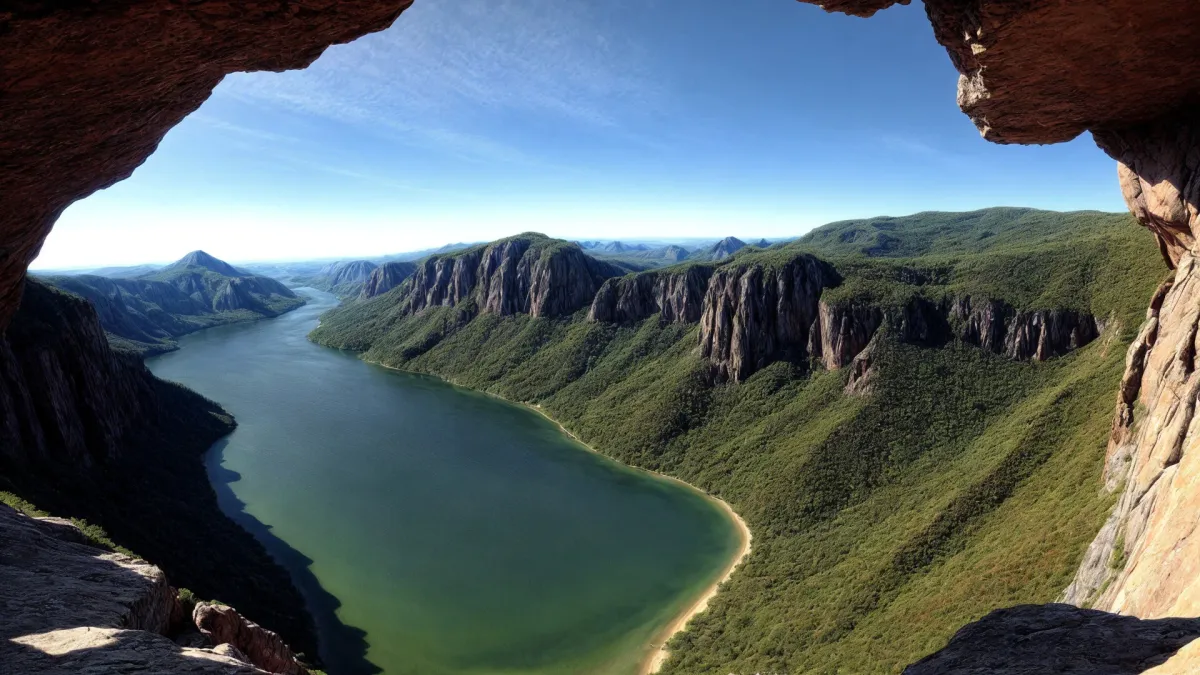
06th Dec 2024 was the first day of GNOME Asia 2024 and it began far earlier for the likes of Sumantro Mukherjee, Samyak Jain and myself than for anyone else connected to the event as we were at the organizing end of it all. We headed downstairs for breakfast around 0630am Indian Standard Time where I had an interaction with a hotel staff who wanted to check with me regarding the breakfast. As I was sure that the breakfast was included in the booking I had made, I decided to have the discussion sorted out before sitting down for some food. As the discussion took quite a while with me having to log back into Egencia again to show the booking receipts, I had to forego my breakfast for the day and instead hop to the Uber ride that had arrived by then. Imagine the irony of the situation where I had to prove that I indeed had the breakfast included in the booking only to not be able to have it in the end as the process itself took too long to finish!

Equipping a coffee cup and seated on the Uber cab ordered by Sumantro, the three of us were on our way to the Red Hat office located in the Carina Building of the Bagmane Constellation corporate complex. With a couple of show of Red Hat badges, we were into the Red Hat office as early as 0715am Indian Standard Time to escort the likes of Muhd Syazwan Md Khusaini, Khairul Aizat Kamarudzzaman, Aaditya Singh and Siddhartha Sitaula who planned to help us with the complicated audio-video recording and streaming situation at the event. While Samyak and I worked on getting the swags ready for the attendees, Sumantro worked on ensuring the attendees who were not from Red Hat could make it into the venue seamlessly. We placed a registration desk beside the reception desk for the GNOME Asia 2024 attendees and made sure that the swags were available for the attendees, speakers and organizers of the event as they checked into the event.\
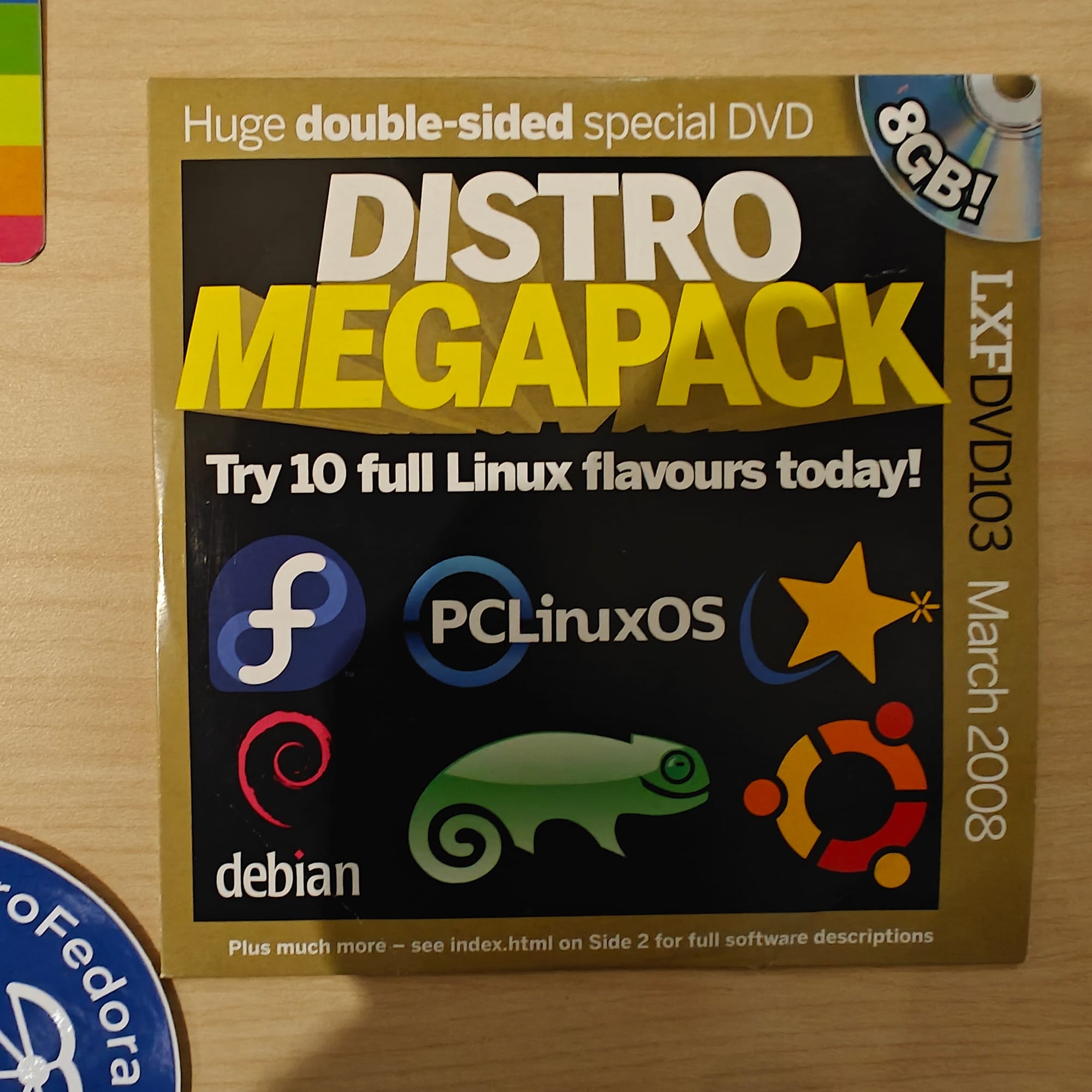
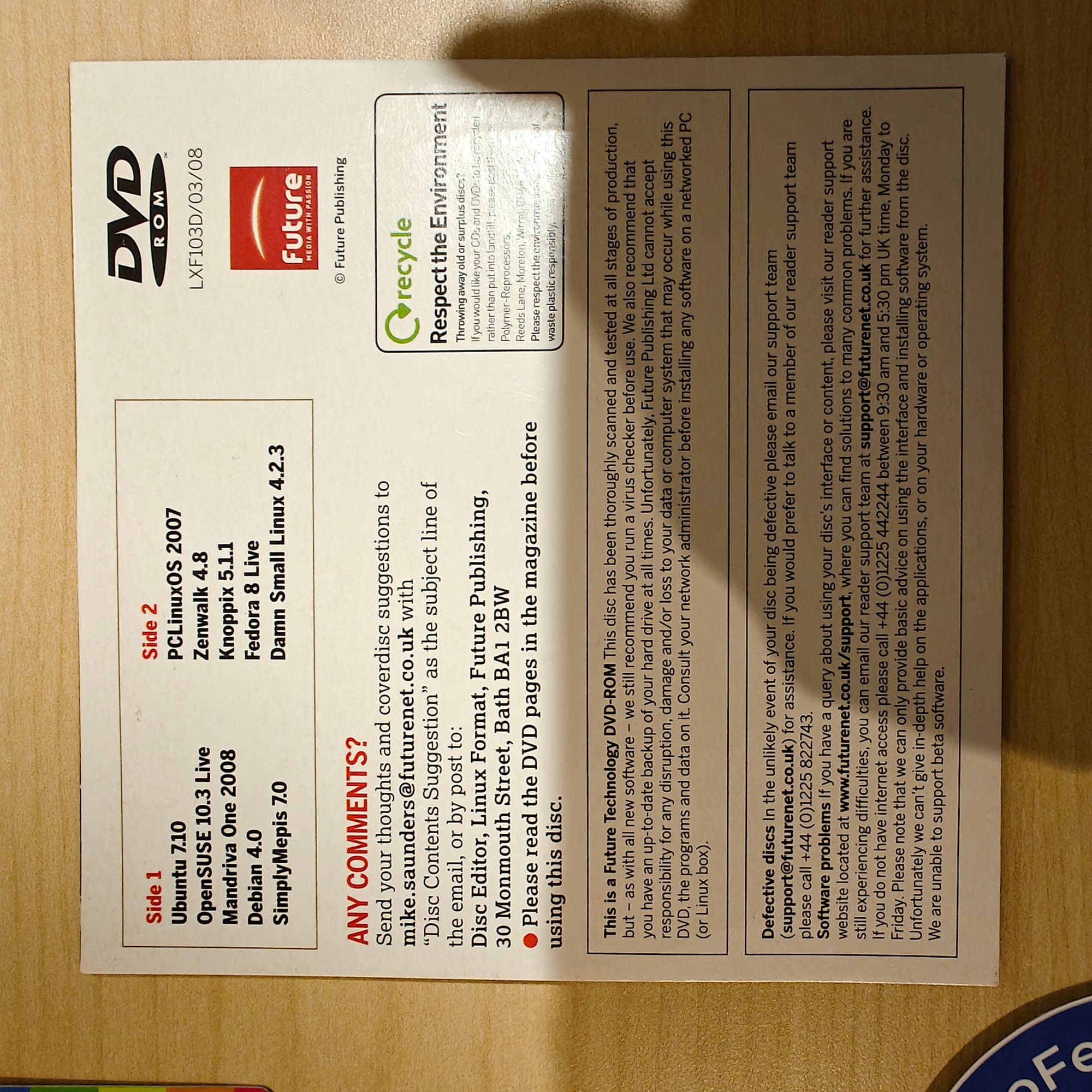
This felt like an ancient relic for some odd reason - The disk shipped Fedora 8 Live from back in 2008 while we are at Fedora Linux 41 in 2024 (Courtesy. Akashdeep Dhar CC-BY-SA 4.0)
The folks from the Red Hat Global Workspace Solution were of immense help in streamlining the planning and placing the event artefacts like standees and cafeteria arrangements there for both the tracks of GNOME Asia 2024. We soon had Sudhir Dharanendraiah arrive at the office, whom I met in person almost after a year and with the arrival of the folks working on the audio-video recording and streaming tasks - we started helping them out with the streaming keys that were provided to us. It was a tricky situation as we were only provided with one streaming key for YouTube and one for the Big Blue Button platform and as we planned on having two concurrent streams - we need two of these. On Sudhir enquiring me about the timeslot for the keynote event of the day, we got to know that the entire GNOME community infrastructure was down and hence, we could not access platforms like GNOME Indico and Big Blue Button for these tasks.
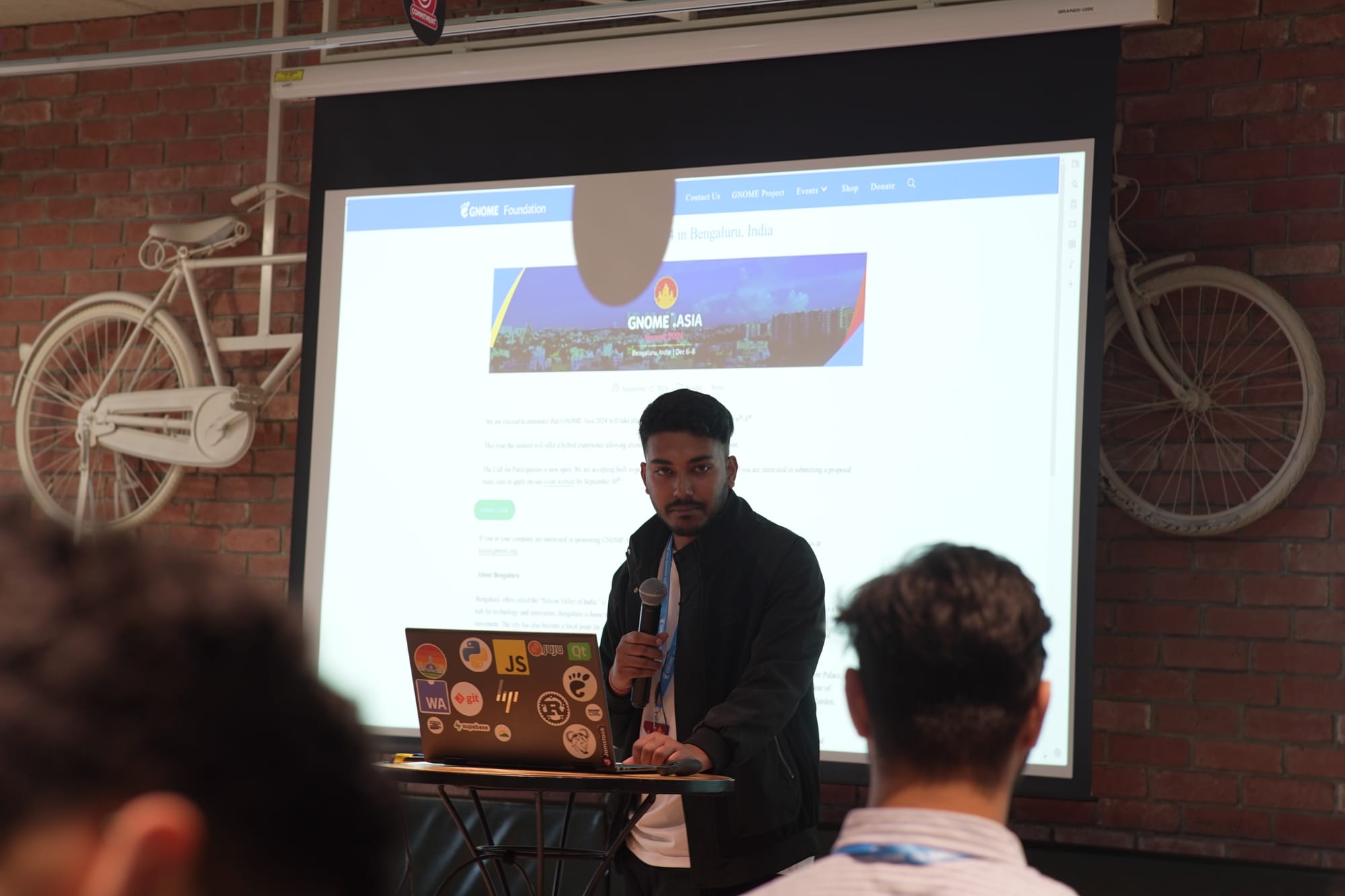
As a means to ensure that the event does not begin any later than the delay it has already faced, the folks from the Fedora Project decided to have the stream begin on the Fedora Project's YouTube channel and then have it switched over to GNOME's YouTube channel once the separate stream keys are made available. I also checked with folks like Asmit Malakannawar and Goutam Tiwari to see if they could spring us a set of stream keys from GNOME's YouTube channel and Big Blue Button platform but to no avail. After around thirty minutes of collectively panicking around the situation, we had access back to the infrastructure and we got to know about Ramakrishna Yekulla's keynote presentation being scheduled as late as 0305pm Indian Standard Time. While Sudhir and I were looking for some possible swaps to ensure that the keynote presentation was appropriately scheduled - we settled with a compromise of having the talk proceed as planned.
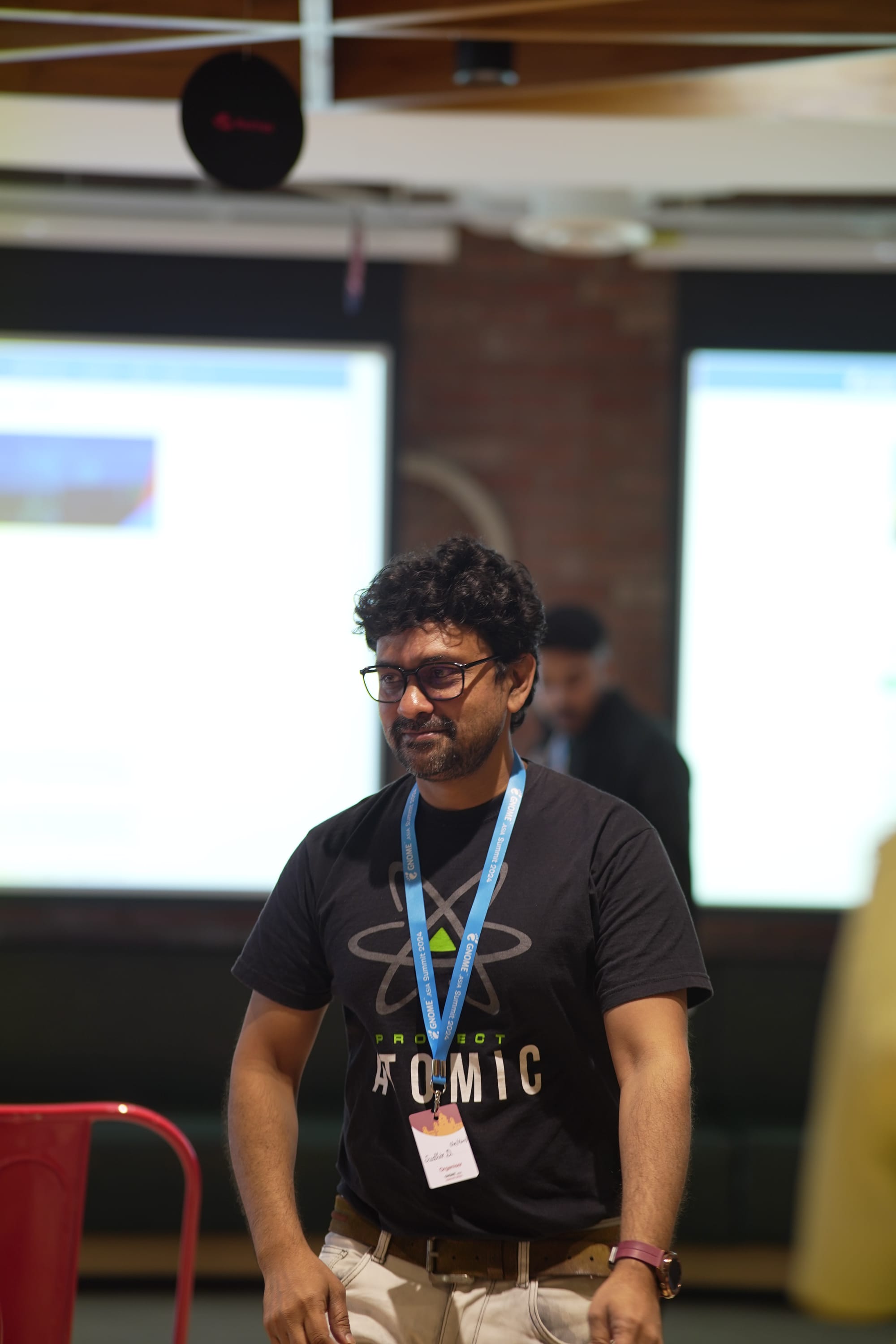
We heard back from Kristi Progri that closing the event days with keynote presentations is something that they did as a tradition - and we folks from the Fedora Project wanted to respect that - even when it felt charmingly out of the ordinary. Focussing on making lemonades out of the lemons we had at hand, we focused our efforts on setting up the recording and streaming and verifying if it worked as intended. Sumantro and I set up the streaming key that Justin W. Flory sent us while he was on his way to the Red Hat office and I helped Aaditya and Siddhartha with setting up their laptops for presentations. The first talk from Jona Azizaj and Smera Goel on "Making Mentorship A Key Part Of Your Open Source Community" began in Track 1 after Aaditya started things with the opening speech. I decided to help Siddhartha out with the second track's handling as Rosanna Yuen was streaming her presentation on GNOME CoC remotely in Track 2.
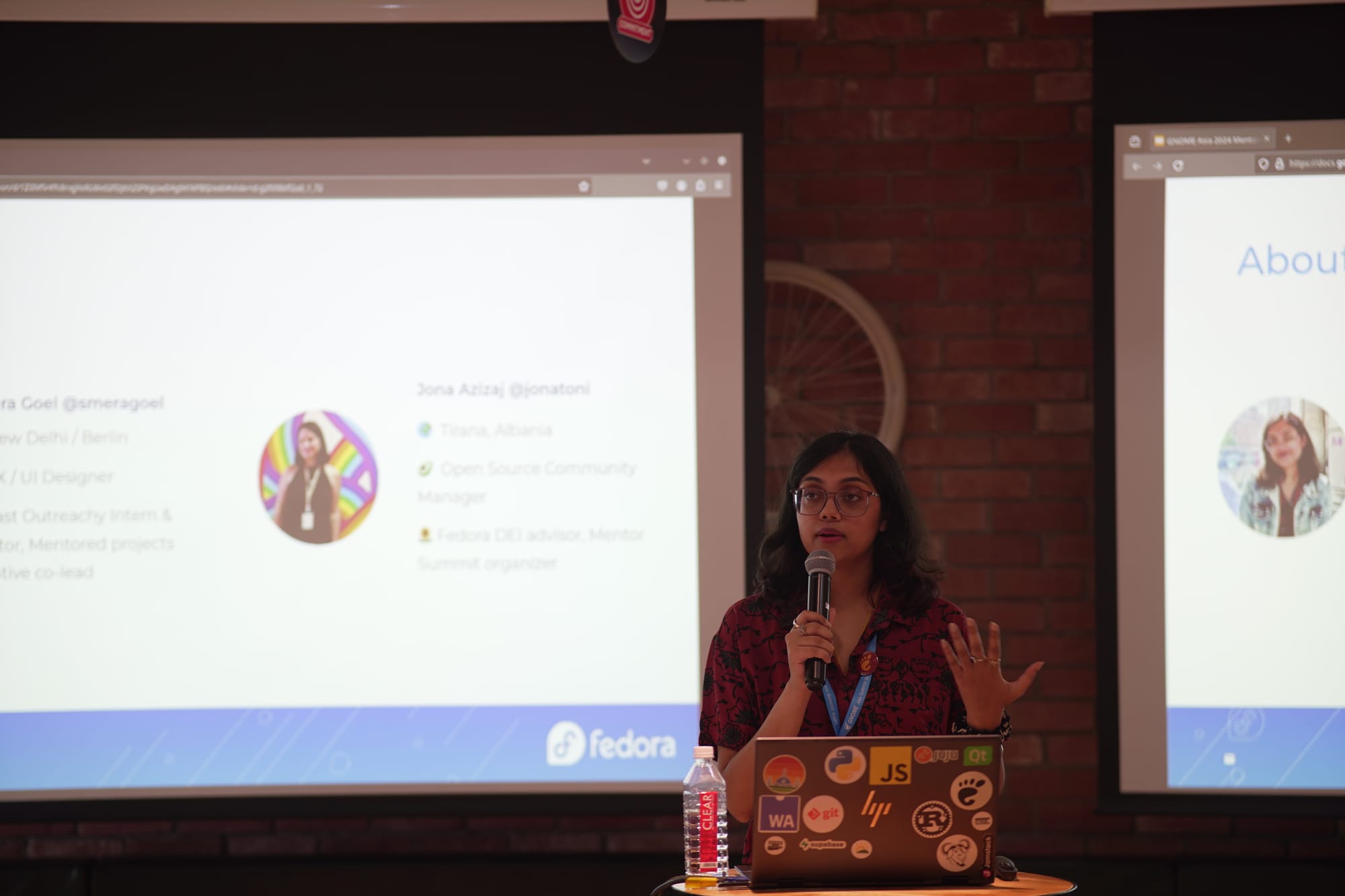
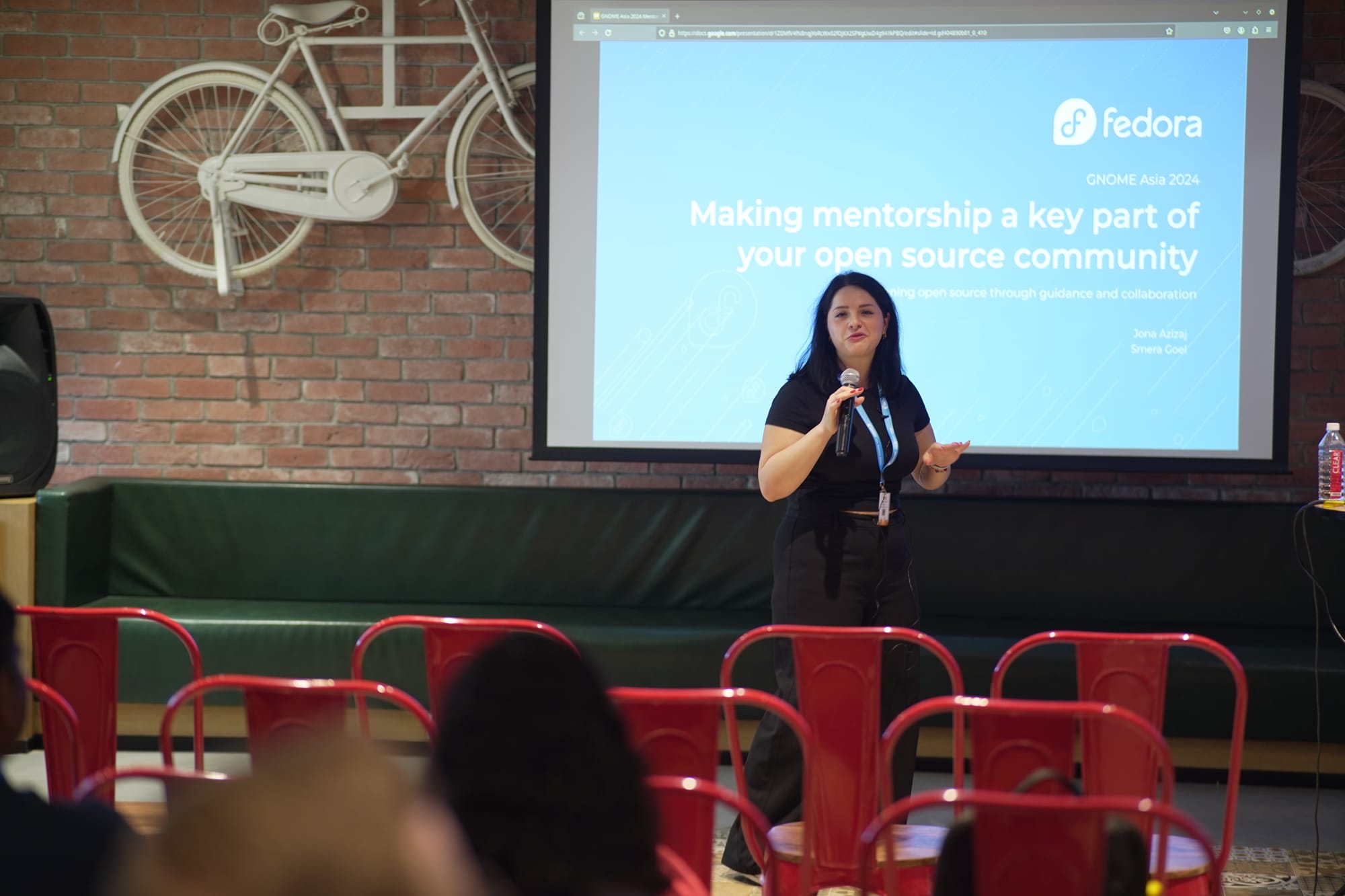
Jona and Smera tagging team to present their talk on "Making Mentorship A Key Part Of Your Open Source Community" in Track 1 (Courtesy. Sumantro Mukherjee CC-BY-SA 4.0)
While the talks in Track 1 began as late as 0945am Indian Standard Time - which was roughly 45 minutes later than the planned starting time, Track 2 had even more delays due to the live streaming situation and having it rerouted through the setup that we had in the Red Hat office. The desperate measure of having streams begin on the Fedora Project's YouTube channel ended up taking folks by surprise as we could not get the streaming keys for GNOME's YouTube channel until the coffee break around 1100am Indian Standard Time. Naveen Kumar reached out to me to check if the presentation shared made it to the laptop or not and then, Sumantro and I decided to have it worked out in a way where Siddhartha's laptop could access the event assets without the need for time-consuming authorizations. Once, Naveen was helped - I mostly focussed on moderating Track 1 and Track 2 and ensuring that things were running as smoothly as they could possibly do.
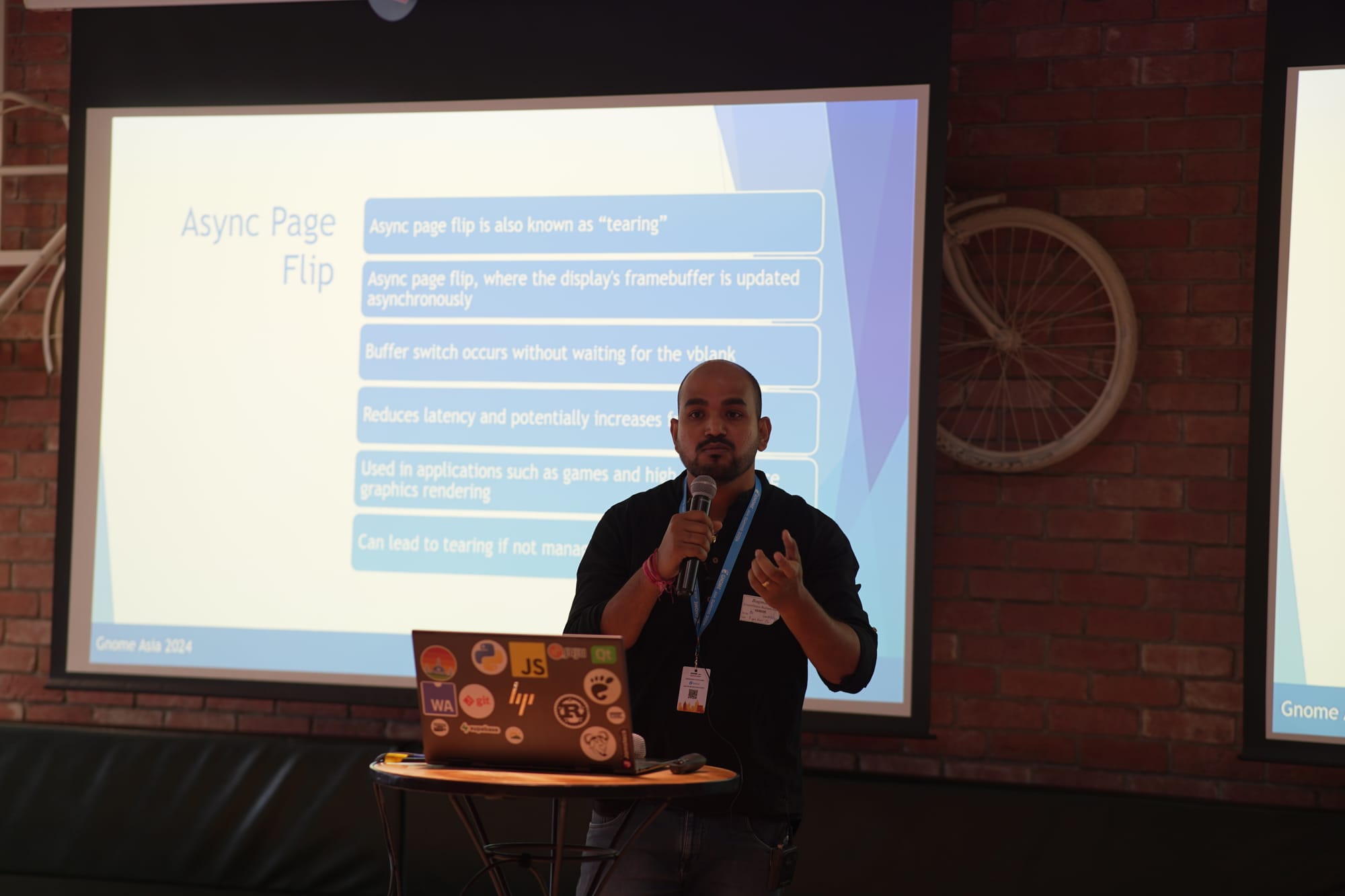
I got a call from Soumadeep Dhar at around the same time who made it to the Red Hat office without much trouble on the way and was looking forward to attending the event. I caught parts of the "Async Page Flip Support in GNOME Mutter" in the stream while I made the last few moments of preparation for the talk that I had next with Samyak about "Infrastructure and Release Engineering - What Goes Into Building Fedora Workstation?". Before the talk began, I made another announcement after consulting with Sudhir about restricting the usage of the coffee machine in the event hall during the talks and using it only during the breaks to ensure that the presentation was not disrupted by the sound it made. Soon enough at around 1130 am Indian Standard Time, Aaditya gave the stage to myself and Samyak for a 50 minute talk which we surprisingly were able to wrap up well within the time including the questions that we had from the attendees.
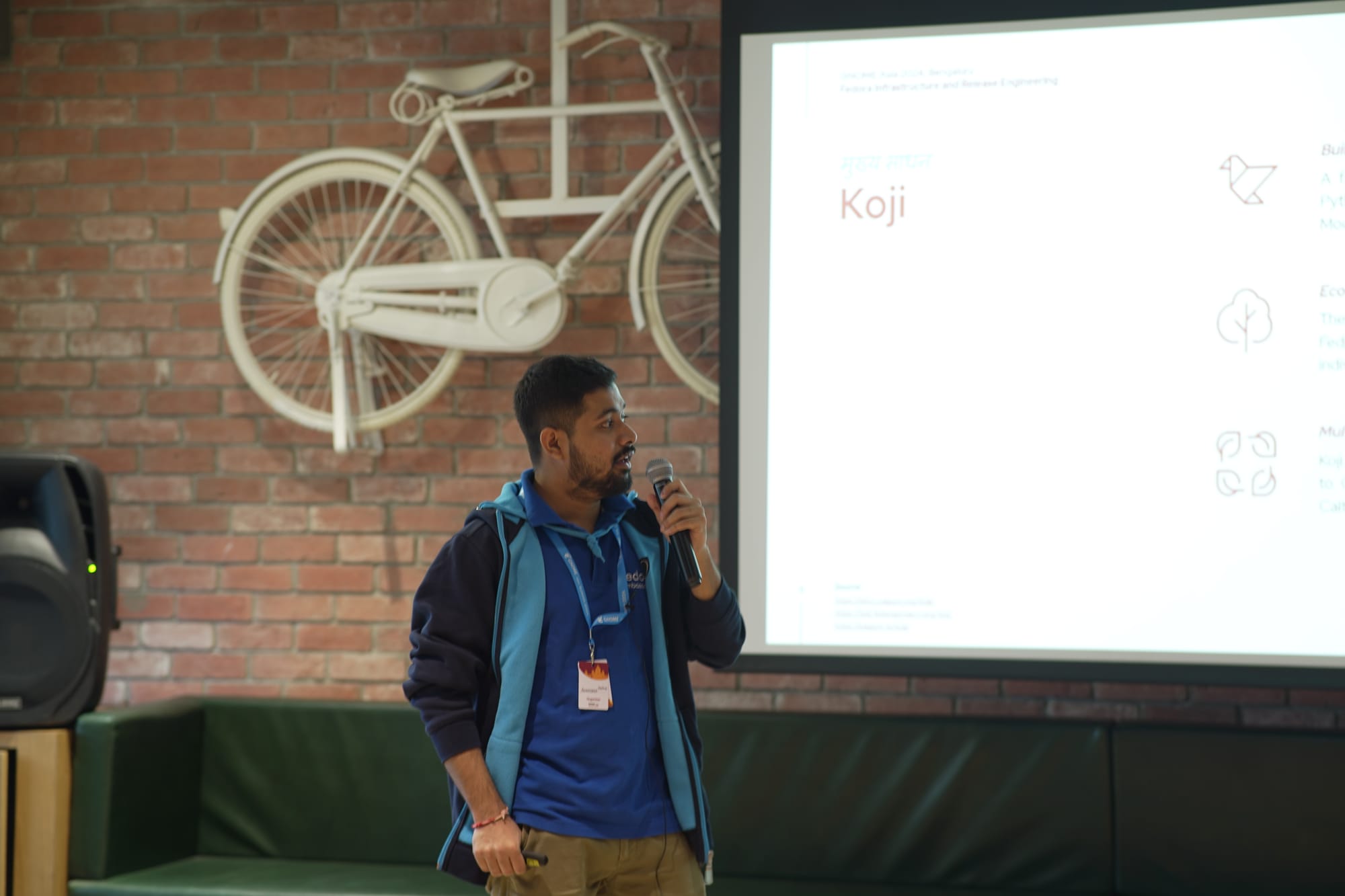
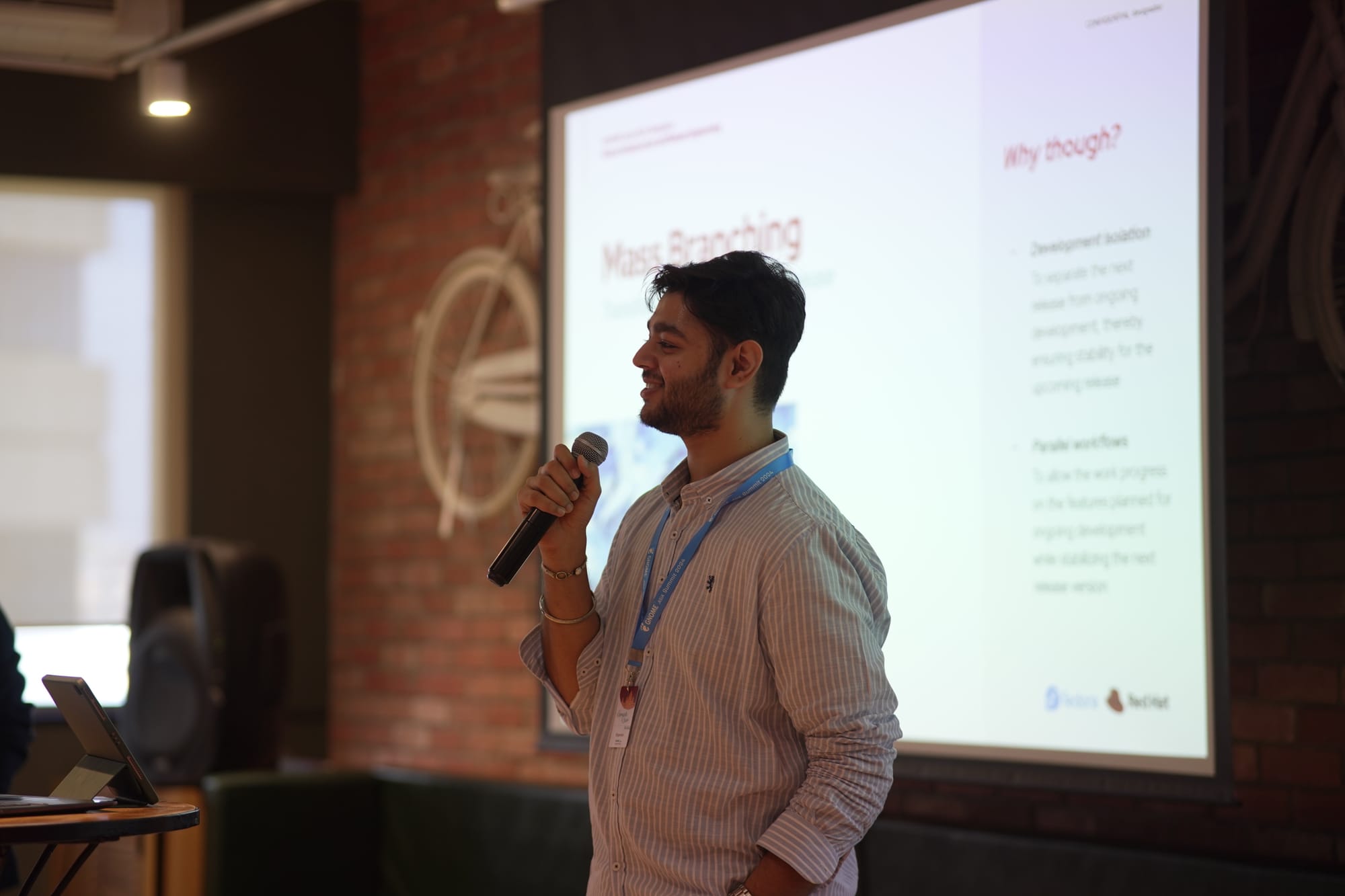
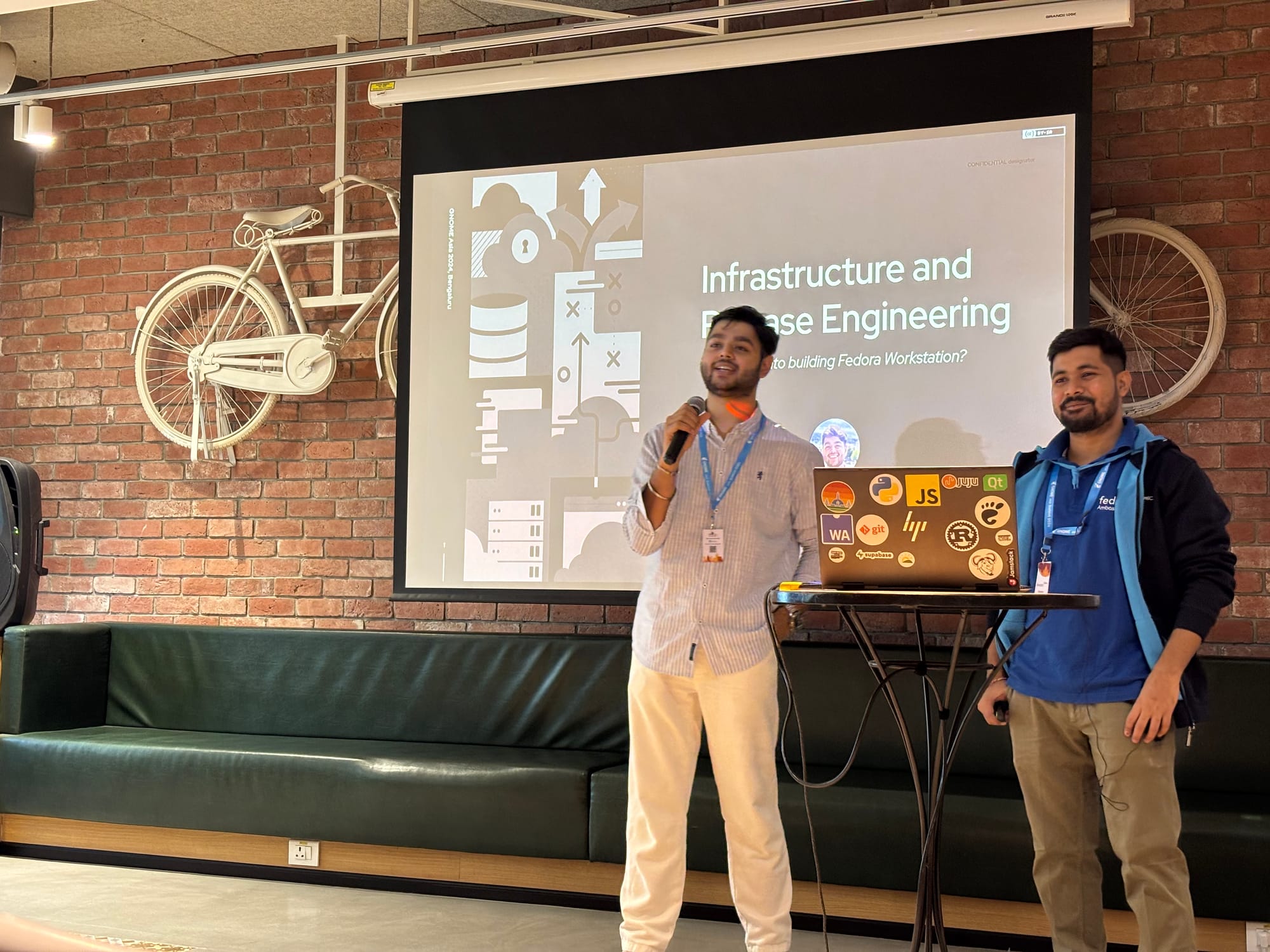
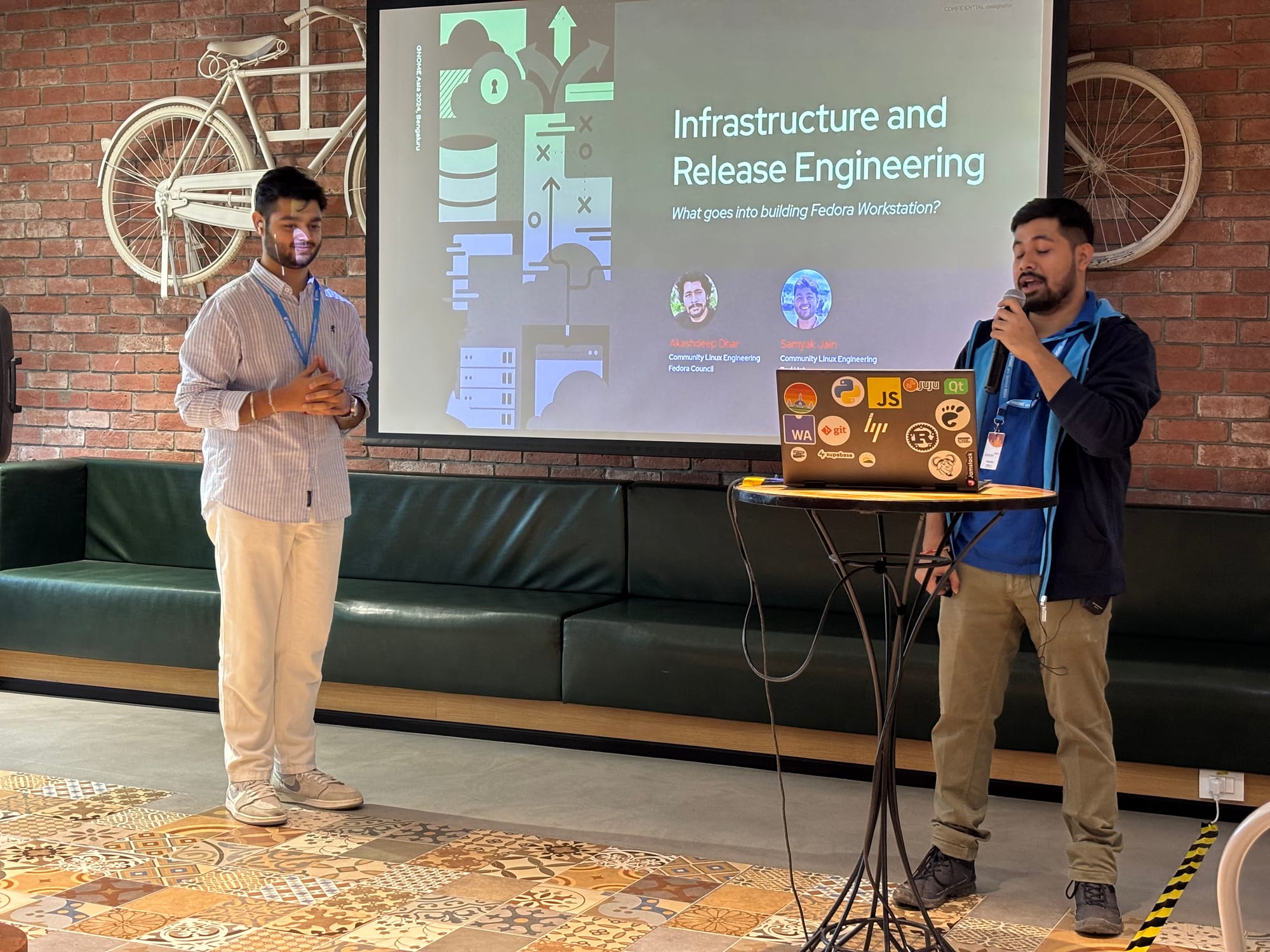
Akashdeep and Samyak tagging team to present their talk on "Infrastructure and Release Engineering - What Goes Into Building Fedora Workstation?" (Courtesy. Soumadeep Dhar and Sumantro Mukherjee CC-BY-SA 4.0)
I have to appreciate Aaditya here as well as he helped ensure that the offsets for the talk durations were made judiciously and he ensured that the late start of the event did not affect the duration and the quality of the presentations in any way or form. I was caught up with a bunch of folks after the talk was through as folks were intrigued with just how much goes into the building Fedora Workstation and we also delved into other aspects of the Fedora Linux offerings as well, such as the inclusion of Ptyxis in the Fedora Linux 41, the purposes of immutable distributions as well as the container-based workflow that is emerging for desktop users too. After some (read boatloads of) pictures taken with the attendees and speakers, I caught a part of Aaditya's talk "Build a GNOME Community? Yes You Can." on the YouTube stream before discussing with the likes of Justin, Sumantro, Jona and Amita Sharma how the Fedora Linux 41 Release Party would go forward.
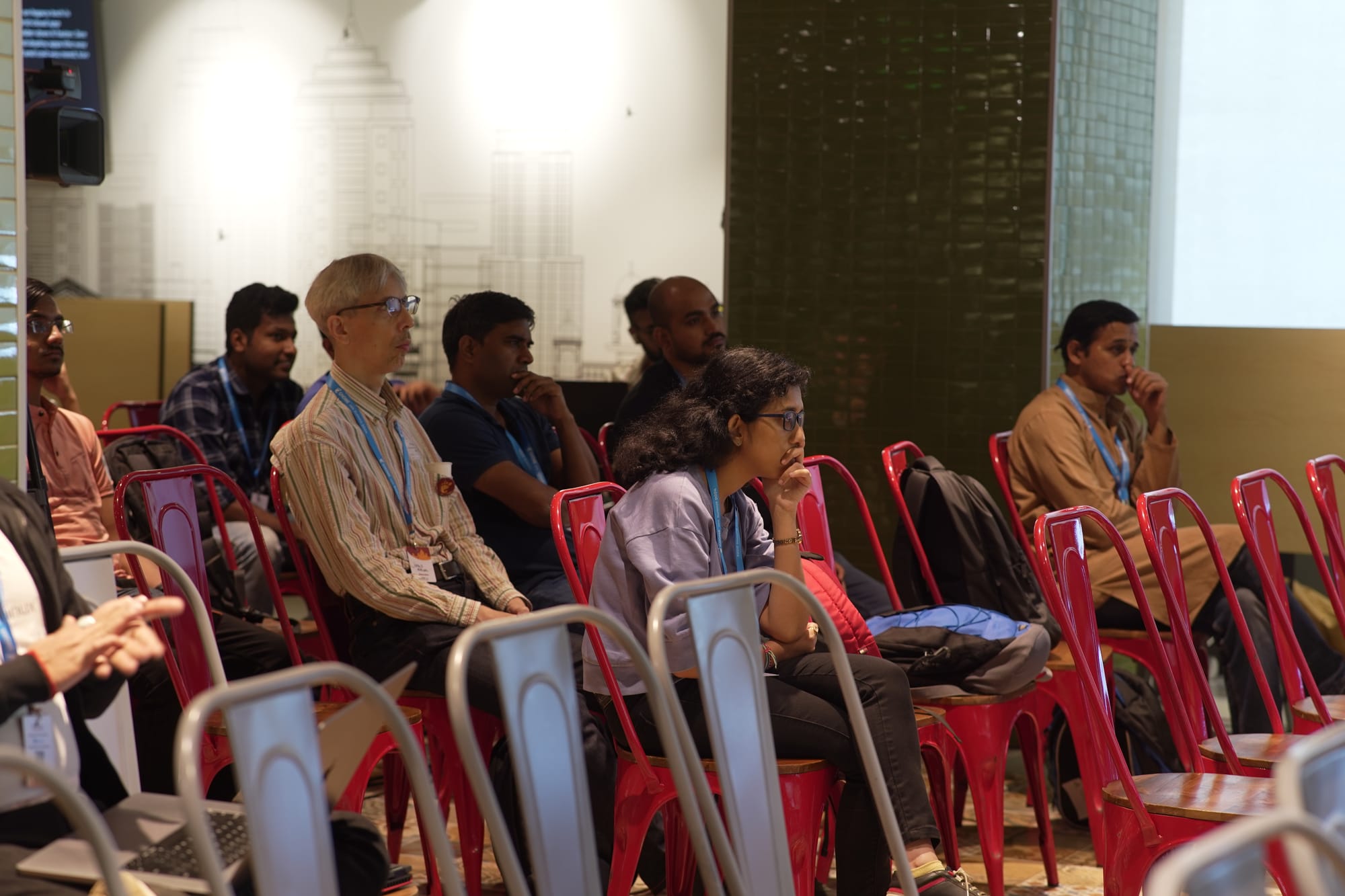
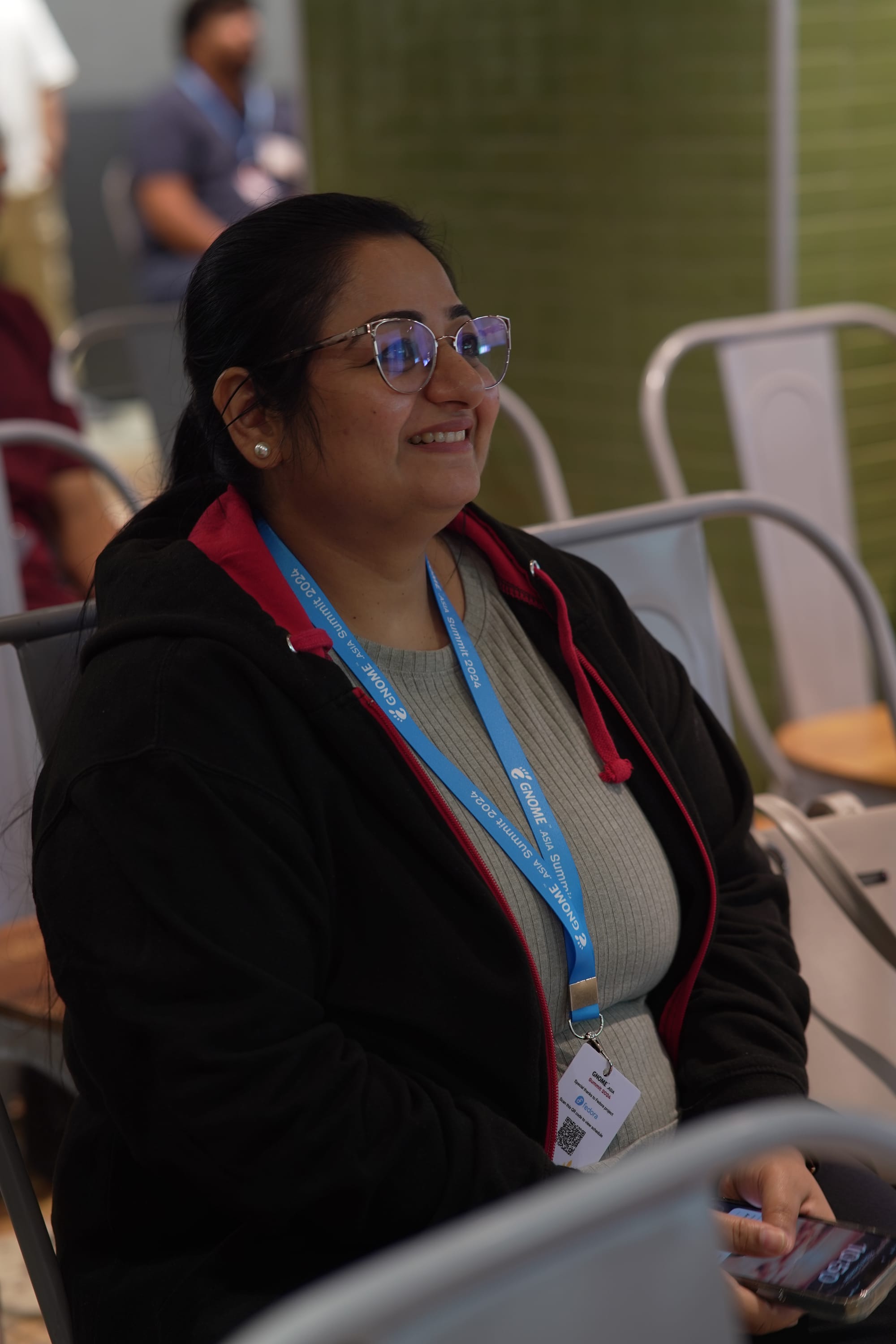
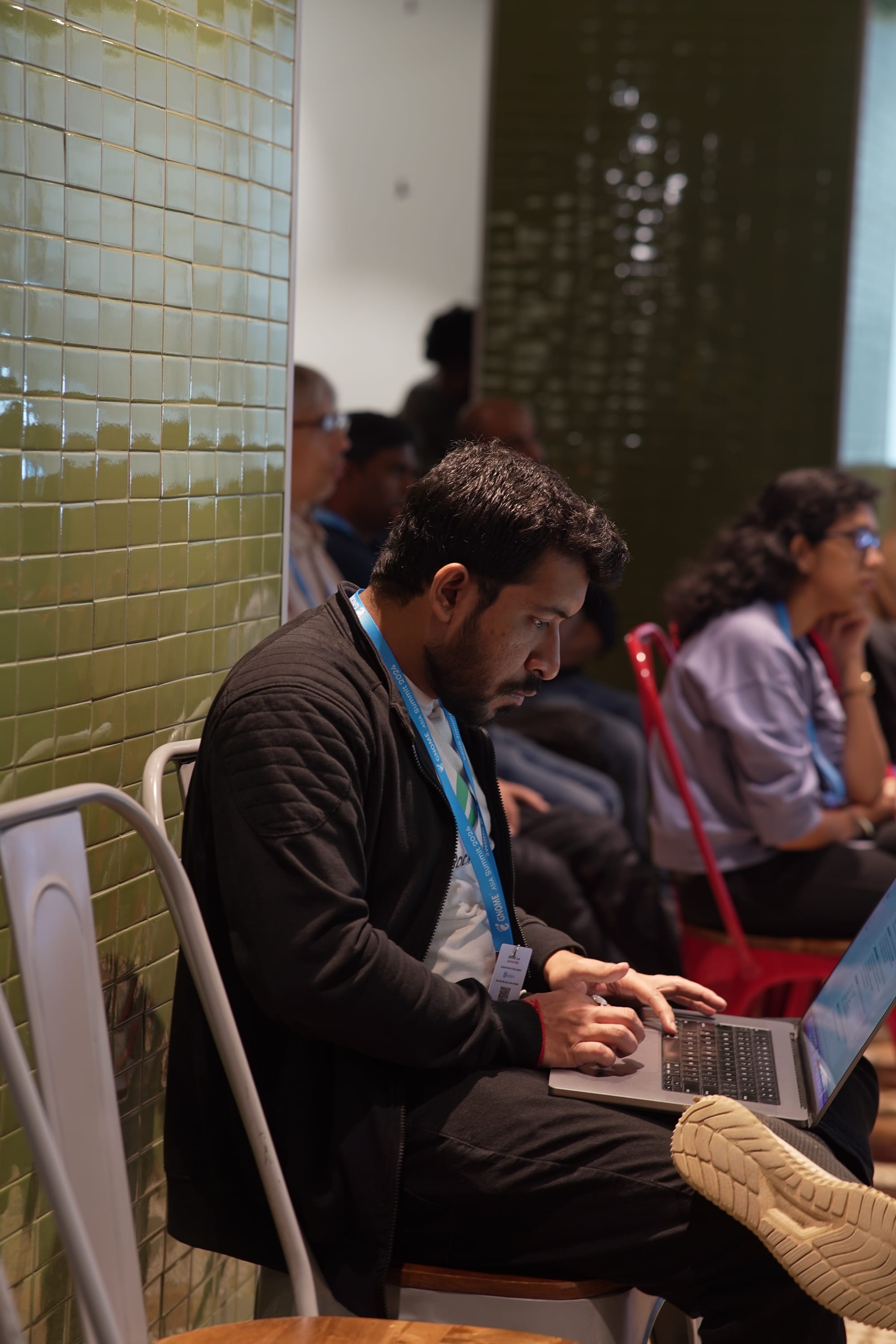
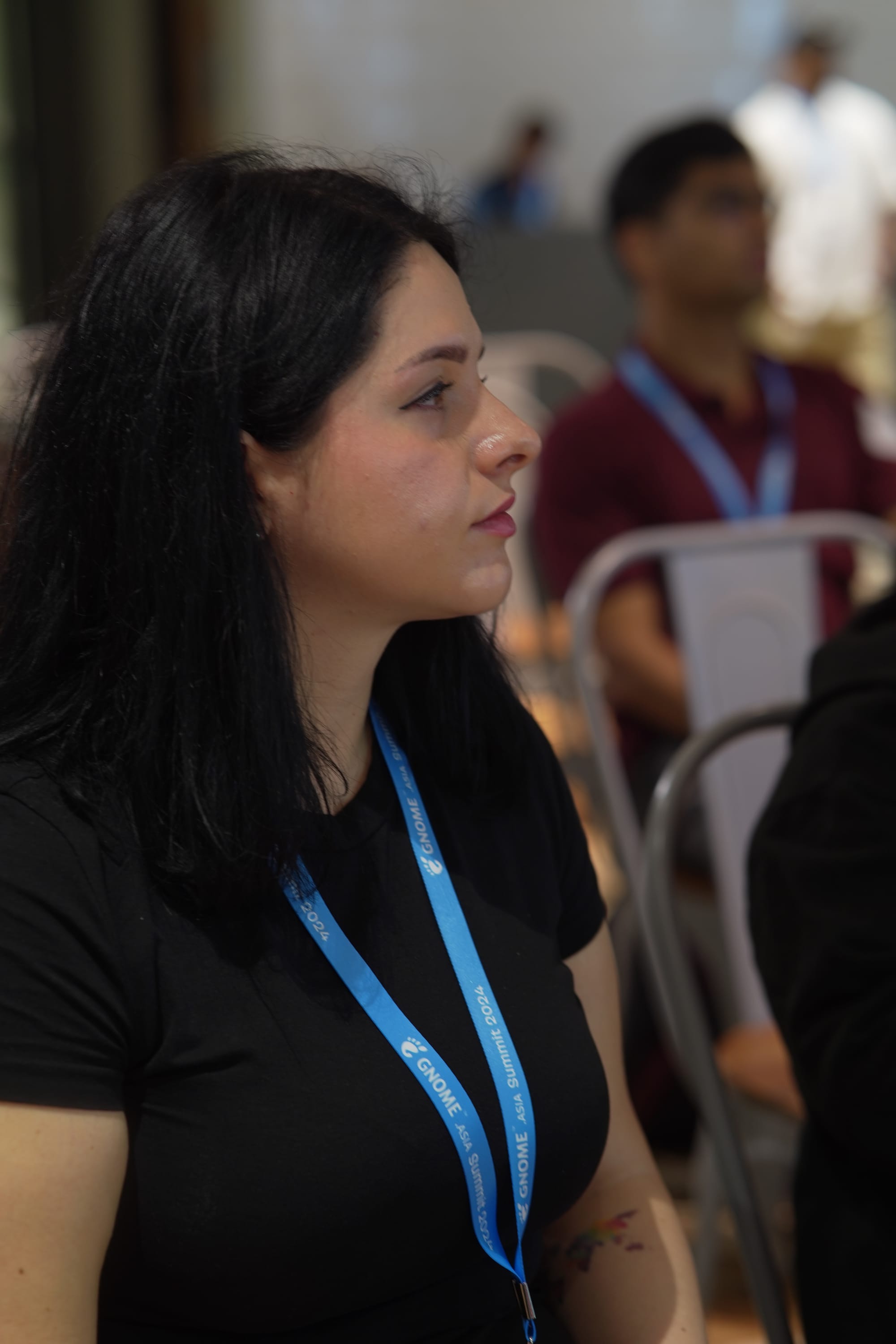
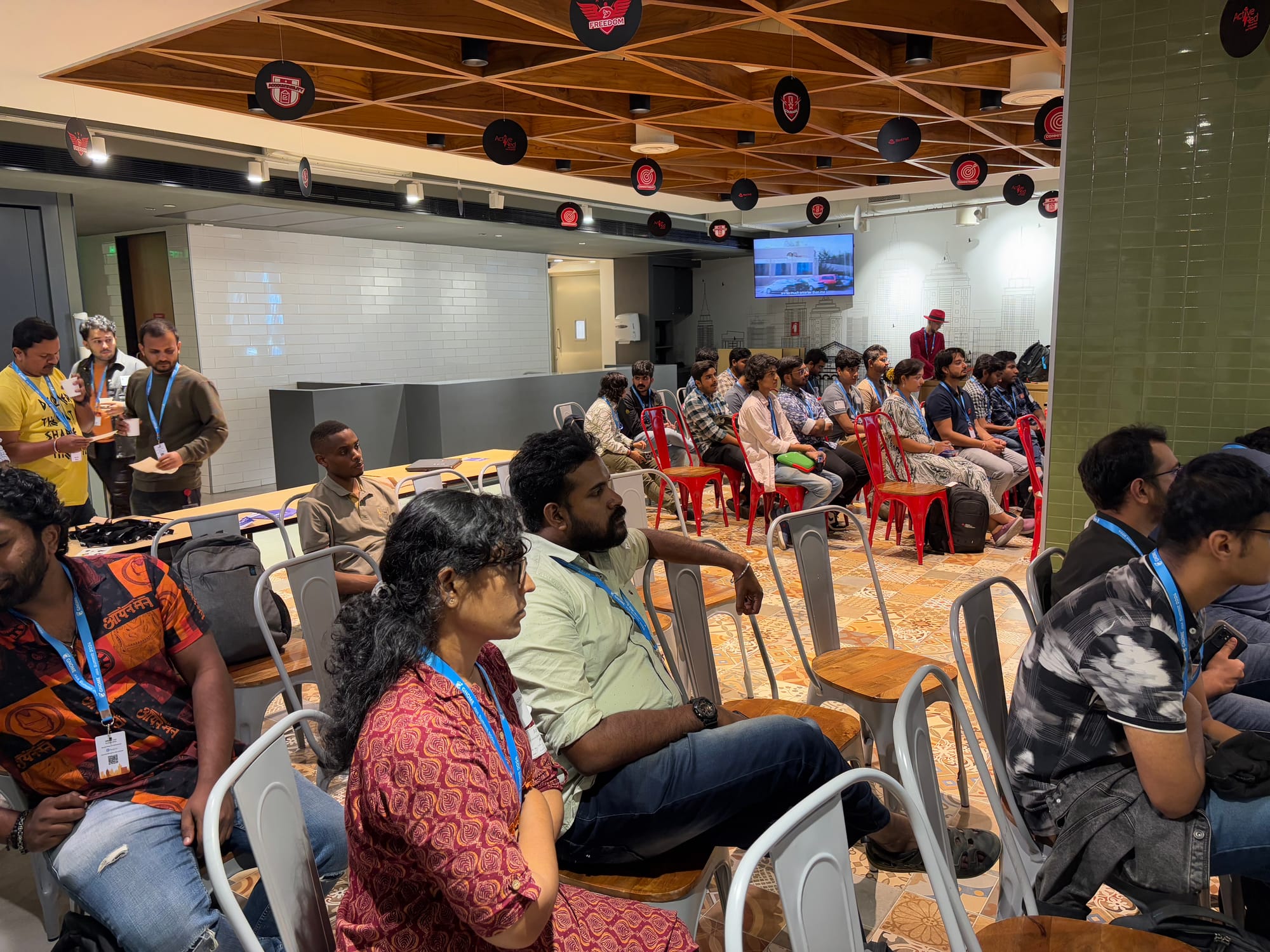
Some glimpses from the audience present during GNOME Asia 2024 conference (Courtesy. Sumantro Mukherjee CC-BY-SA 4.0)
A wide assortment of rolls was ordered, both from Vegetarian and Non Vegetarian types, for folks who were willing to stay back for the Fedora Linux 41 Release Party as we wanted to make sure that people did not end up feeling hungry for the rest of the presentation. Sudhir, Soumadeep and I shared rolls for lunch and we worked with Samyak to ensure that the Fedora Project-themed swags were made available to the folks for picking. The Fedora Project 41 Release Party included Justin's introduction to the Fedora Project, then Amita's introduction to Red Hat Instruct Lab, then Sumantro's insights into Fedora Quality Assurance and finally, Jona's talk on Fedora Project's Diversity, Equity and Inclusion efforts. While we had some concerns about the participation of folks in the Fedora Linux 41 Release Party event, we were surprised by the attendance that we had at the time. I would call that a grand success in my books with the bidirectional interactions we had.
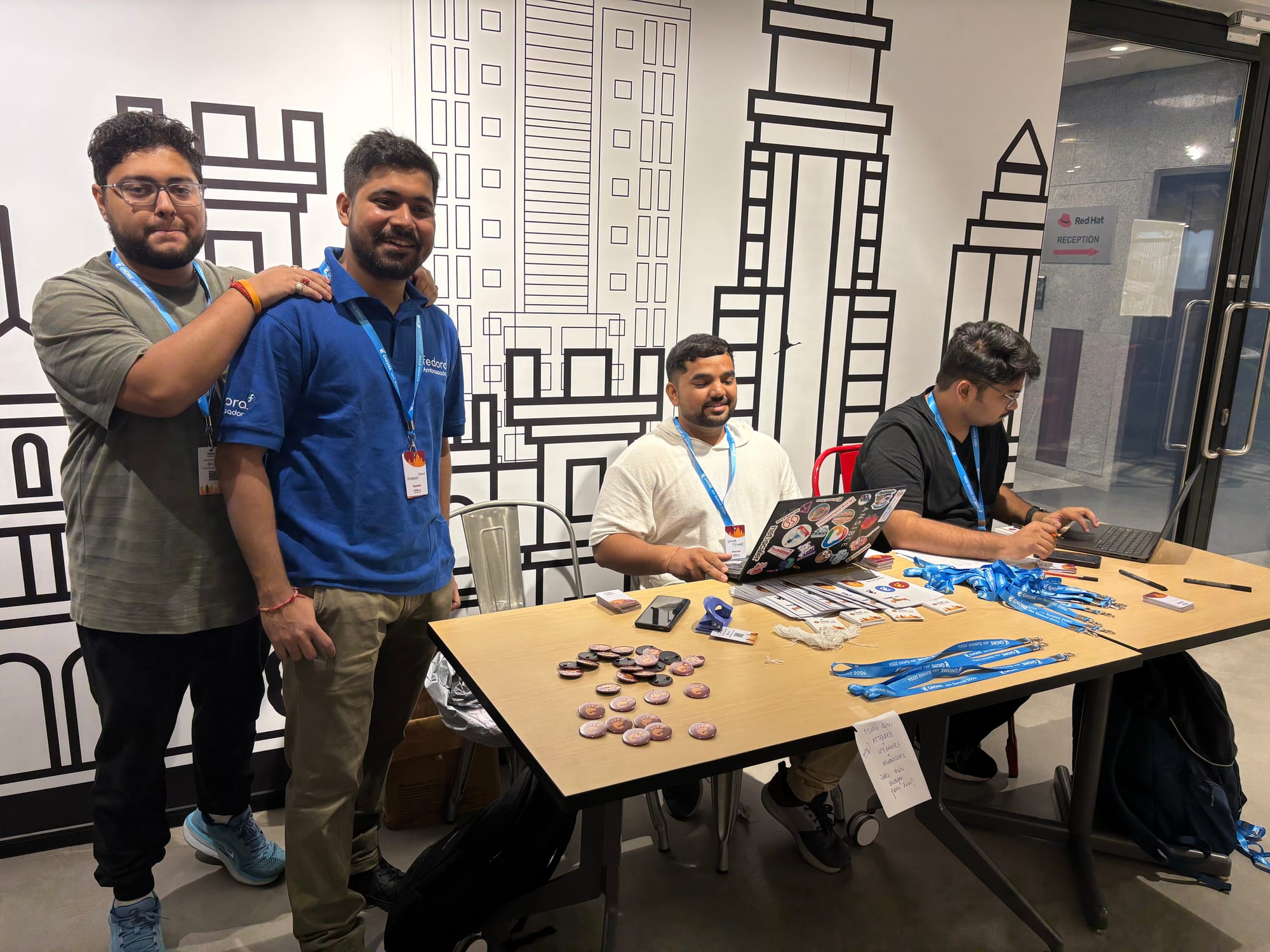
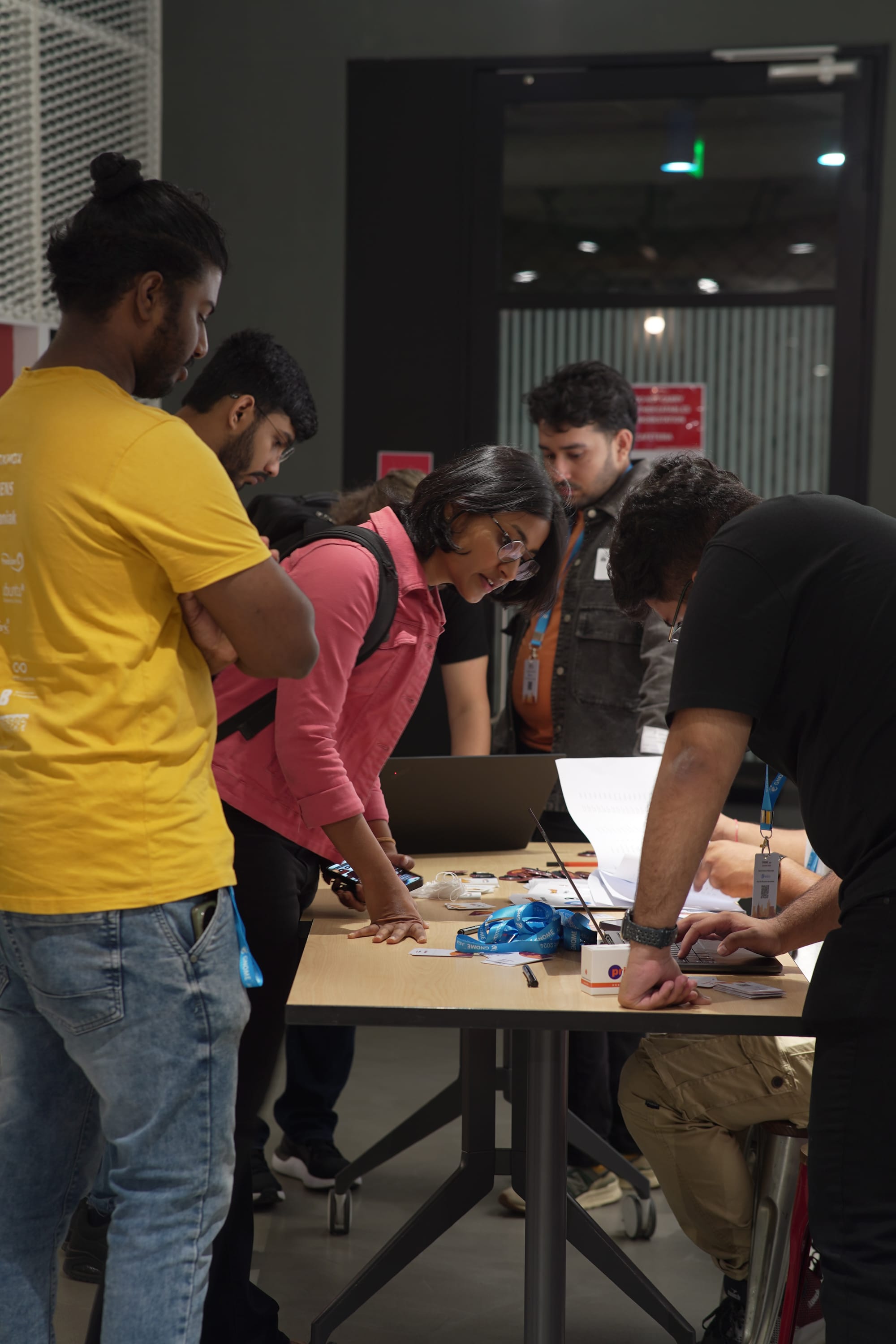
Special appreciation goes to Goutam and Asmit for handling the registration desk for the GNOME Asia 2024 event (Courtesy. Sumantro Mukherjee and Soumadeep Dhar CC-BY-SA 4.0)
I was reached out by Saumili Dutta and Aditya D. right after the event was through who inquired about the Non Disclosure Agreement (or NDA) situation for the event venue. I admitted to what looked like poor communication made by the event venue management and ensured that this should not be any cause of concern for the attendees. Once the conversation with them was through, I wished them luck for their talk on the next day and headed to check with the registration desk to see if Asmit and Goutam needed any assistance from our end. They handled things pretty well with the attendees coming up impromptu and with those who had only registered as a speaker but not as an attendee. I got myself a 3XL-sized tee shirt that Justin got for us from Flock 2024 Rochester as a souvenir as I could not, unfortunately, get to attend the event myself due to the tricky situation I had with the USA visa - I was not sure if I would be able to wear such a large size.
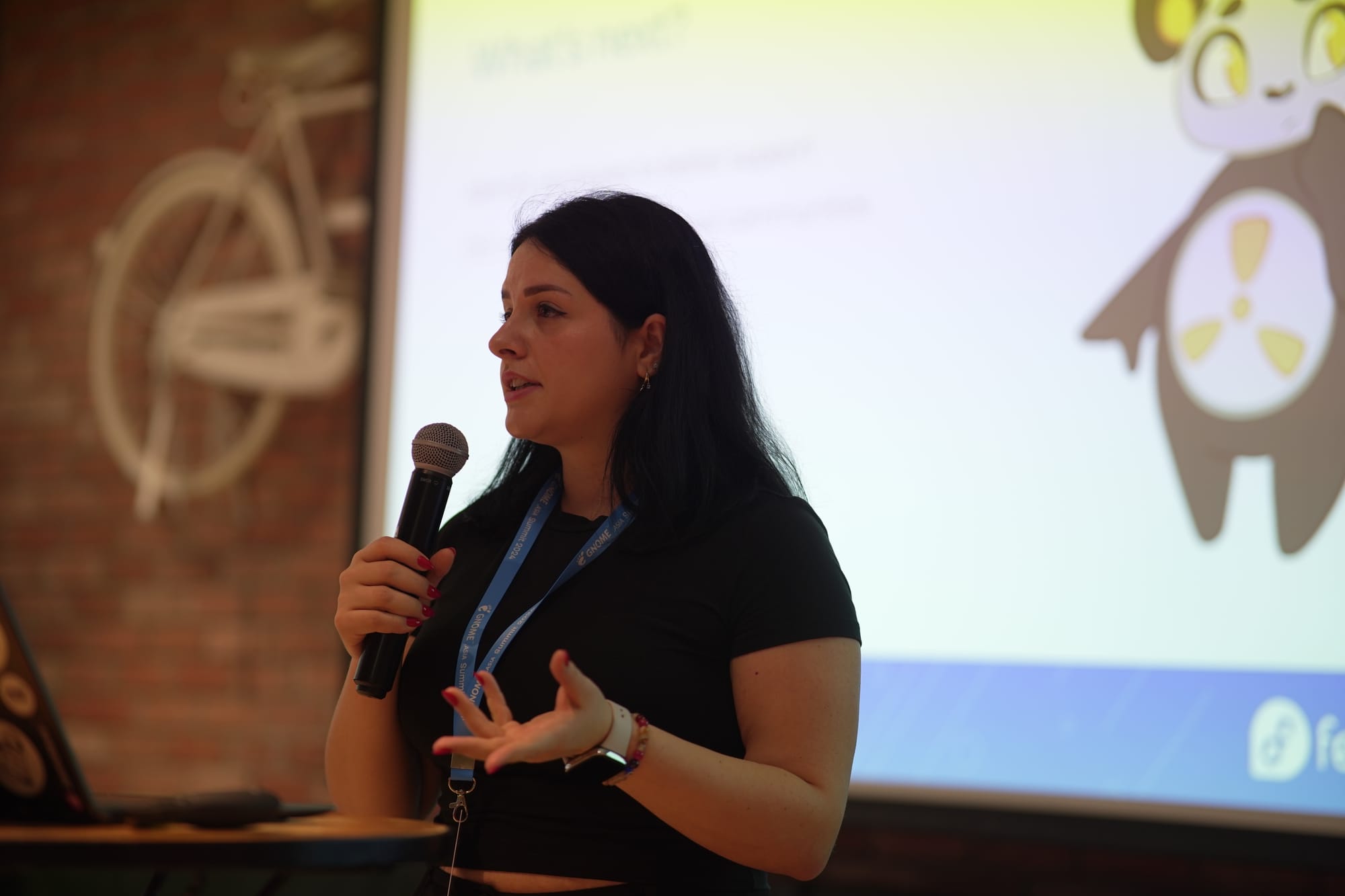
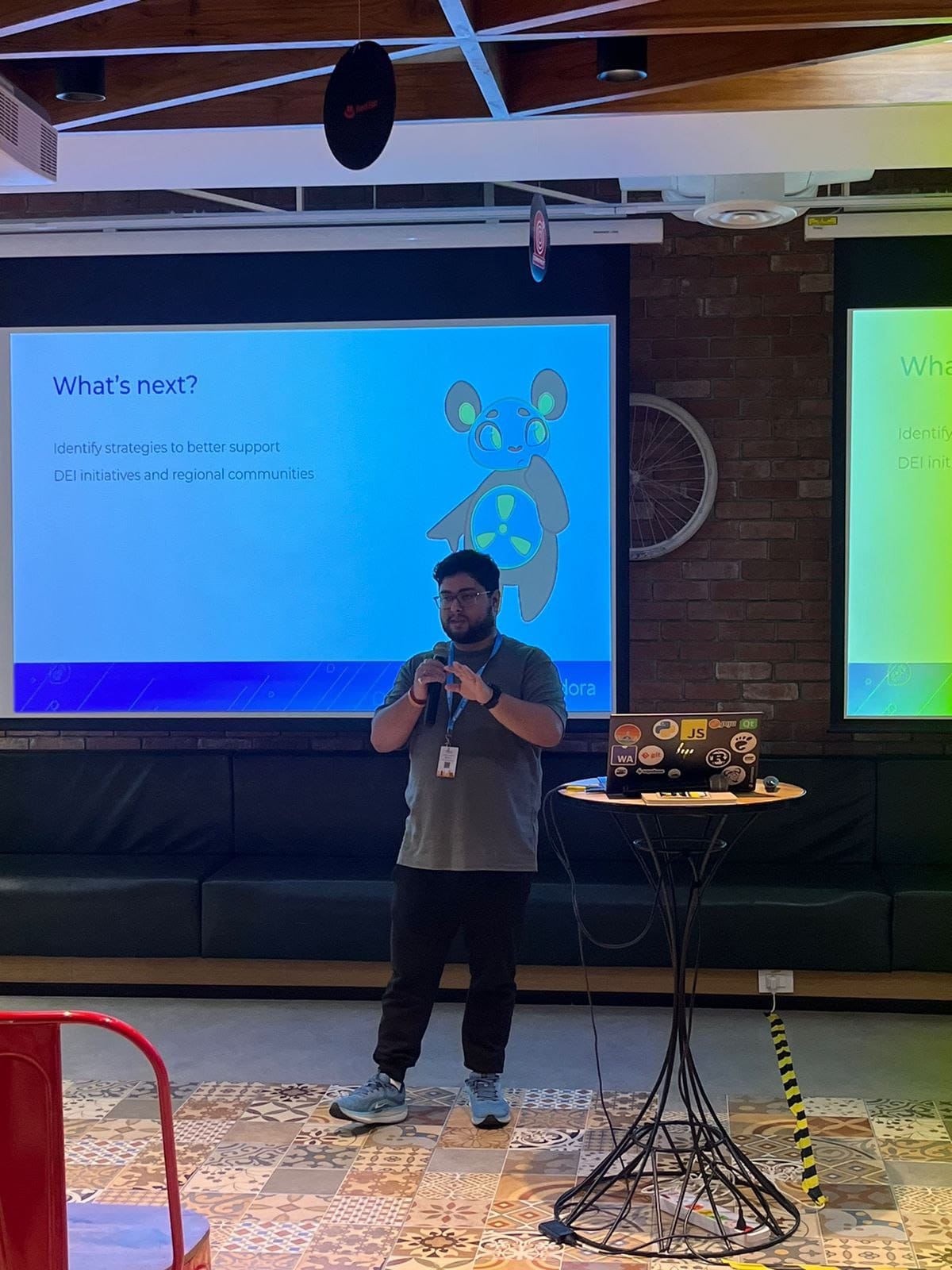
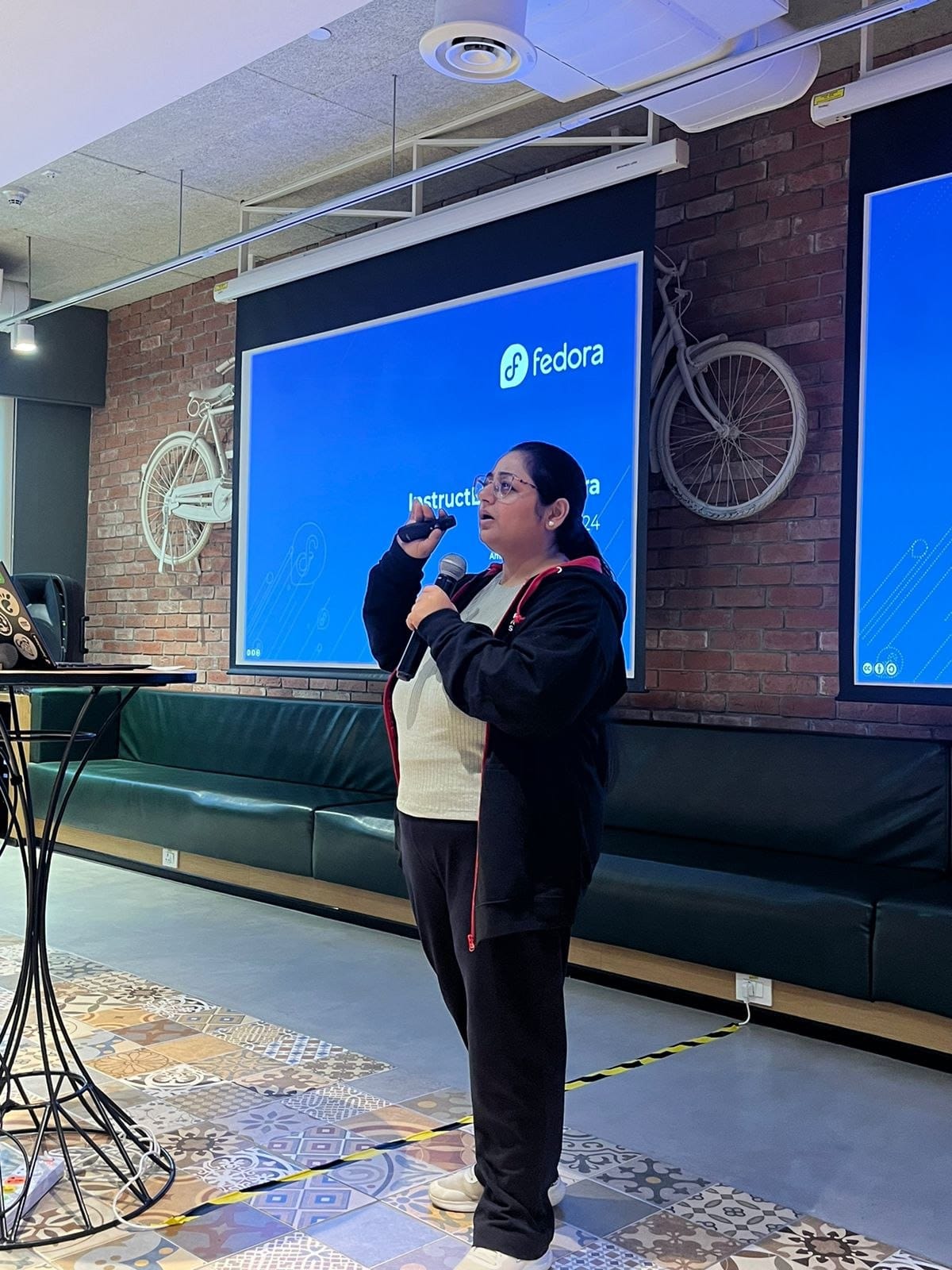
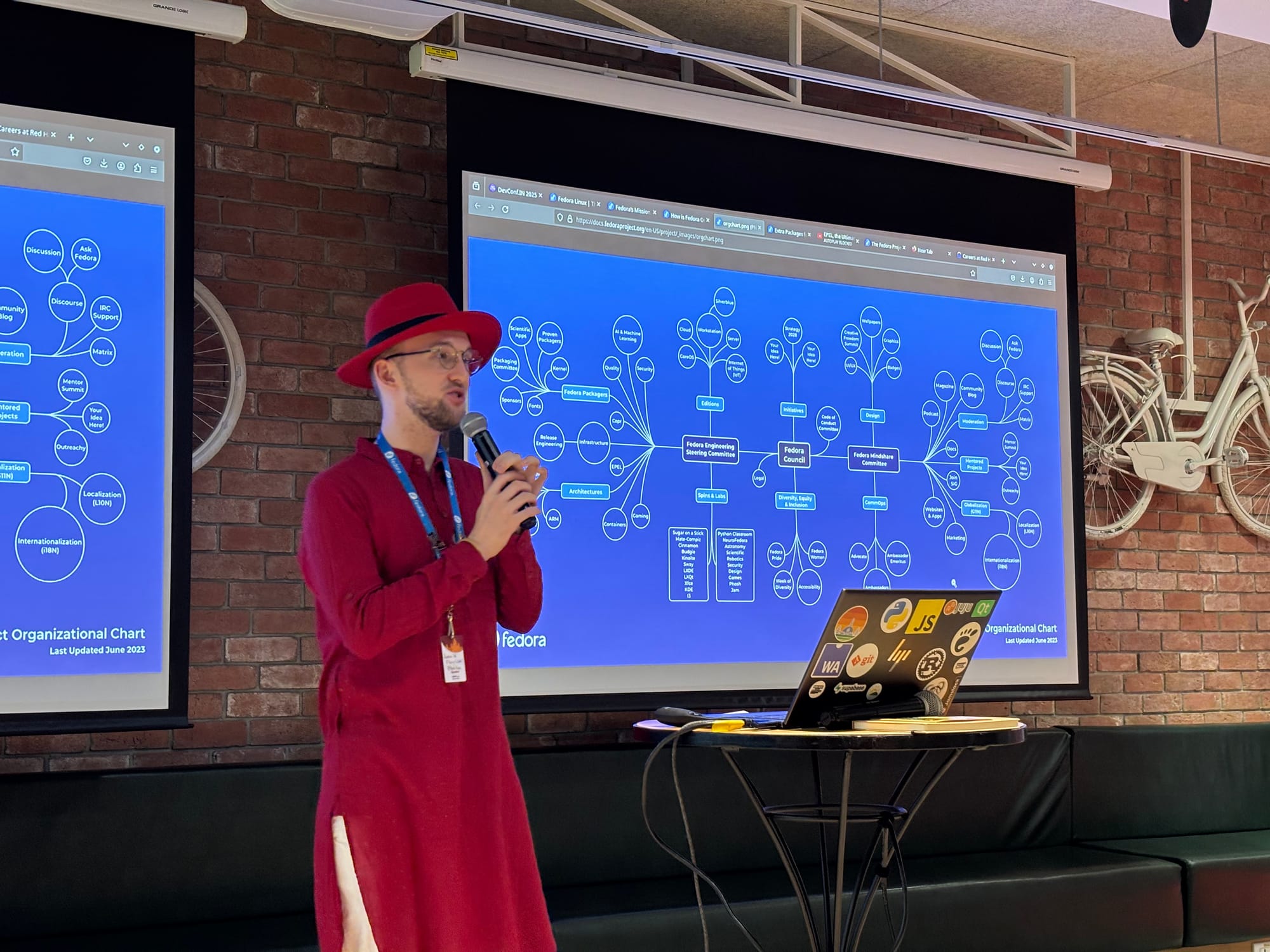
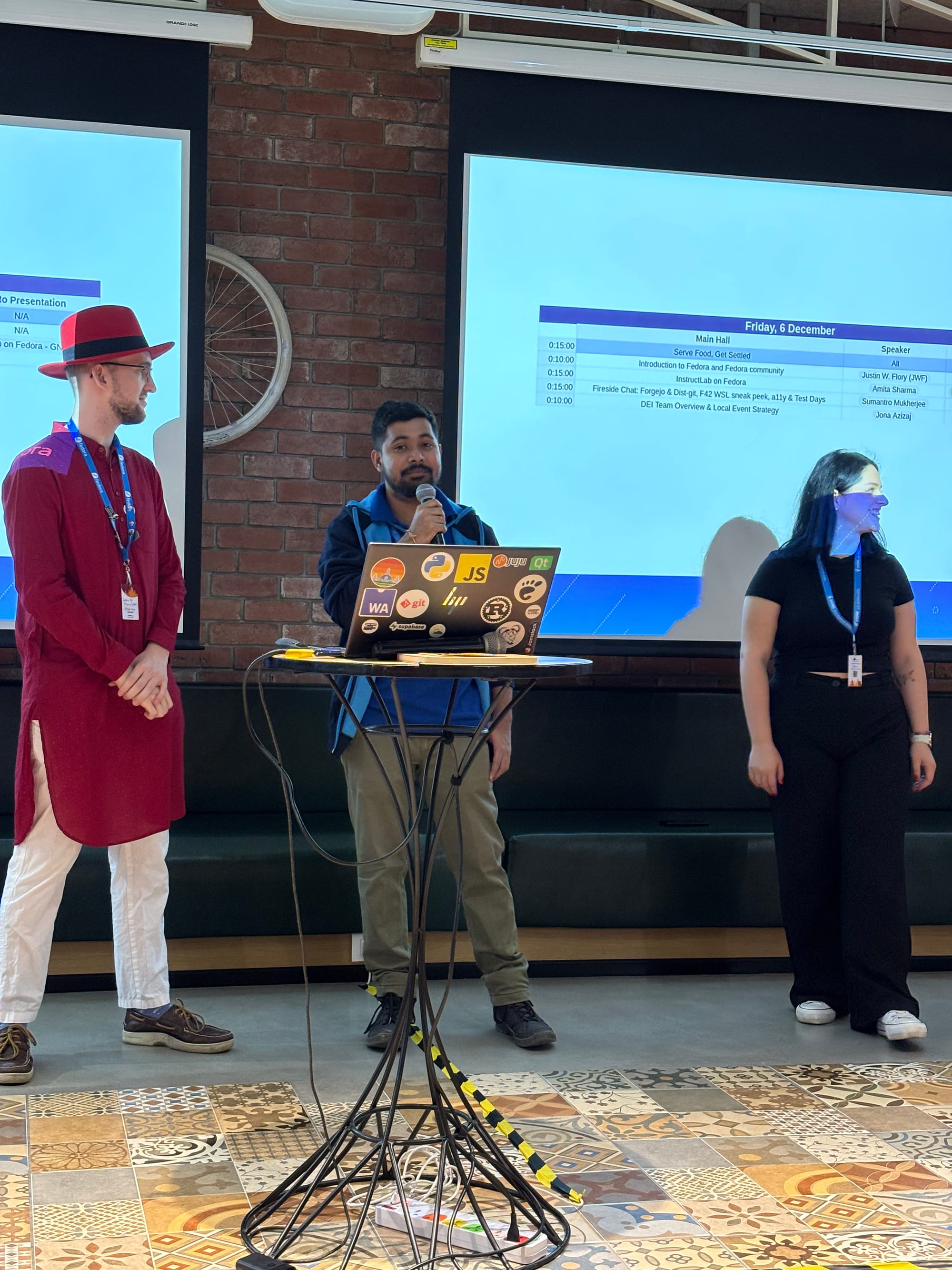
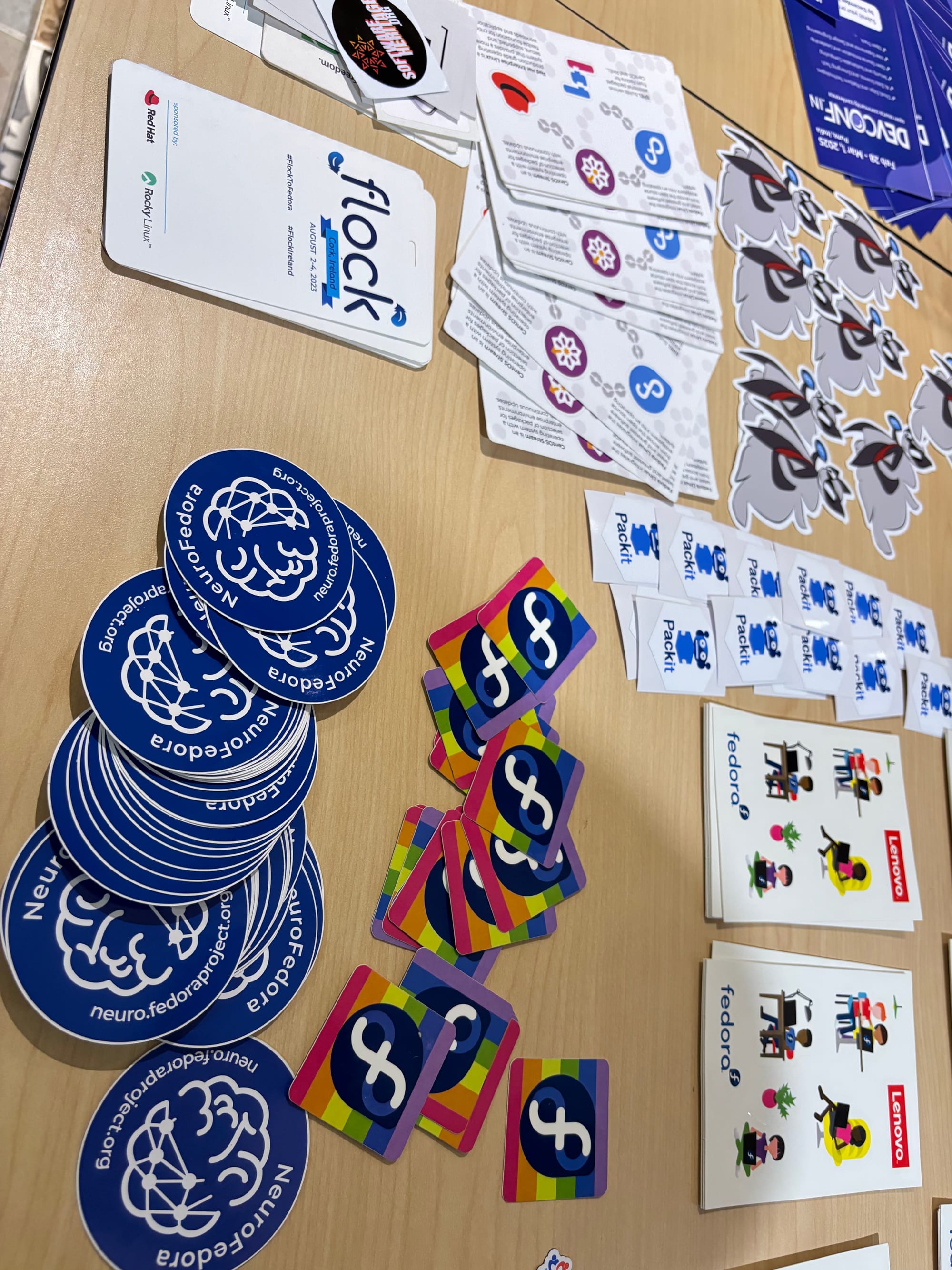
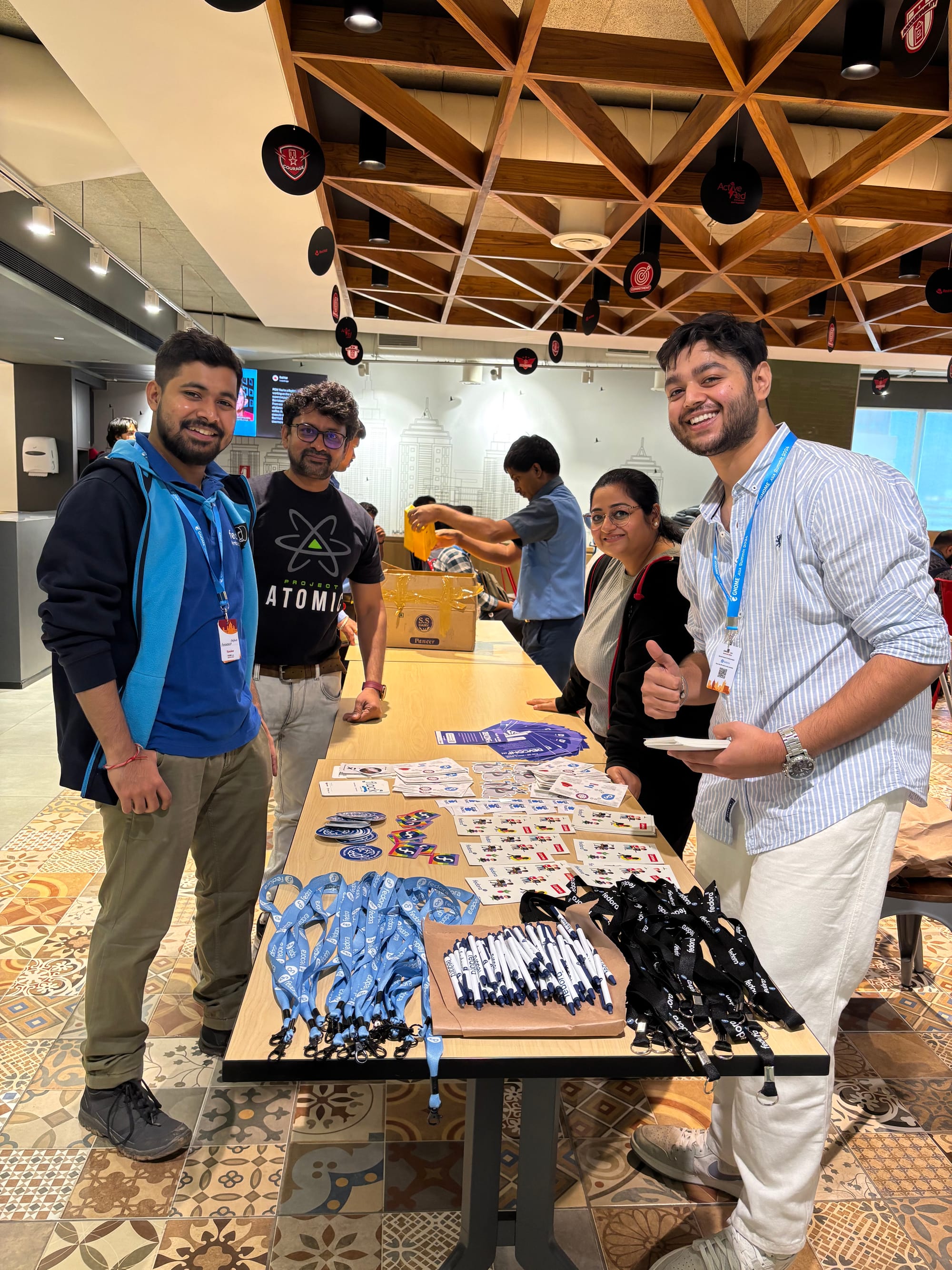
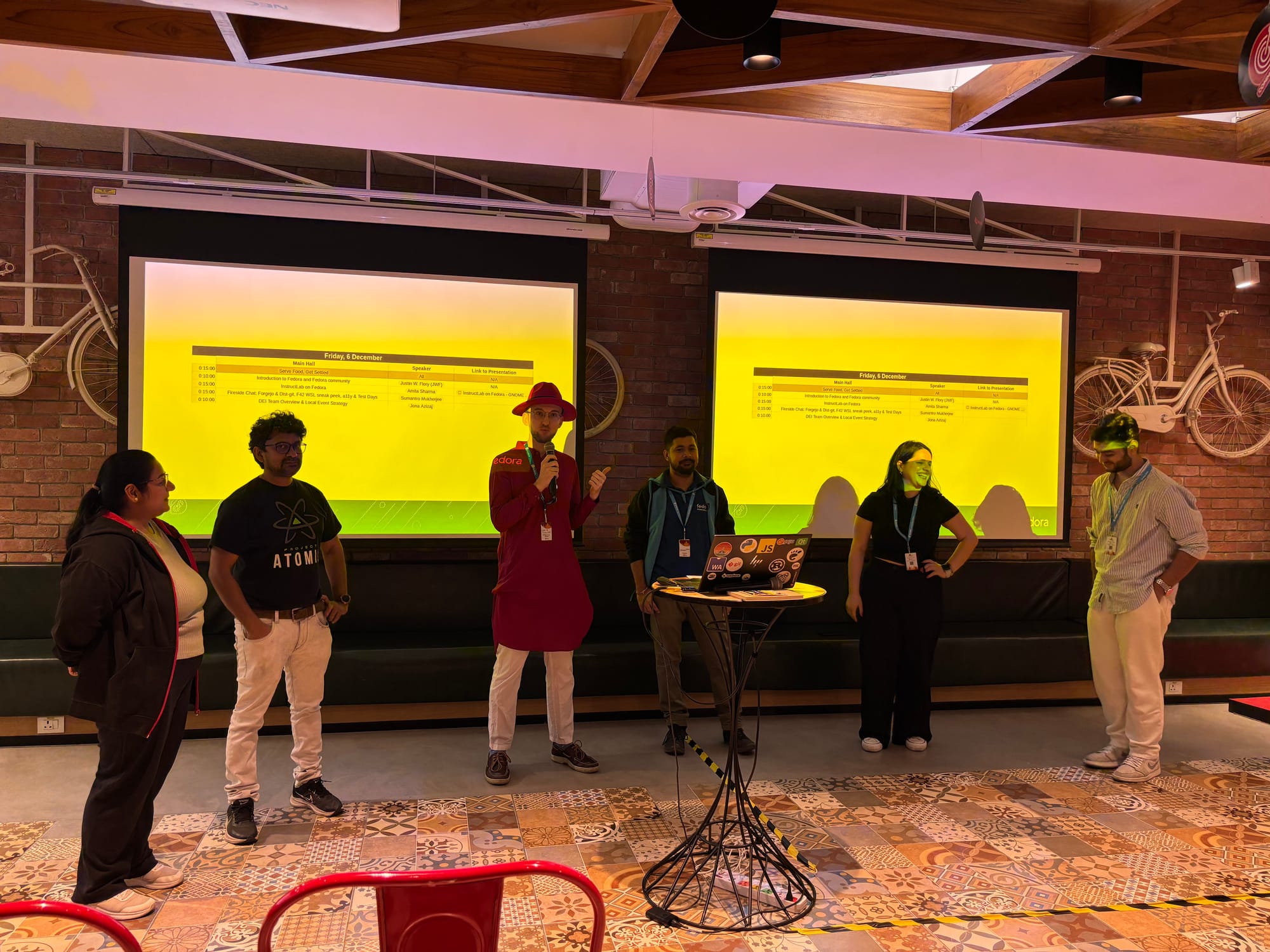
Some glimpses from the Fedora Linux 41 Release Party during the first day of GNOME Asia 2024 conference (Courtesy. Sumantro Mukherjee and Soumadeep Dhar CC-BY-SA 4.0)
I also met up with Raman Sarda again after our previous encounter during my talk that day, when he was looking for the folks working on Phosh. I guided him to Suraj Kumar Mahto at around 0100pm Indian Standard Time - who talked about the same topic soon. Retiring myself to the meeting room situated beside the reception area as my social batteries were just about to run out, I decided to begin working on my presentation titled "Introducing SyncStar - Create Bootable Media At Conference Kiosks" for the next day while catching up on the remaining talks via the streams which were now reinstated on GNOME's YouTube channel. To my chagrin, I discovered that the flash drives that Justin got from Micro Center did not have properly stated identifiers due to which they were facing conflicts during the flashing process. The VENDOR_ID which was supposed to be available in the UDEV section was not present which was usually the case for these flash drives.
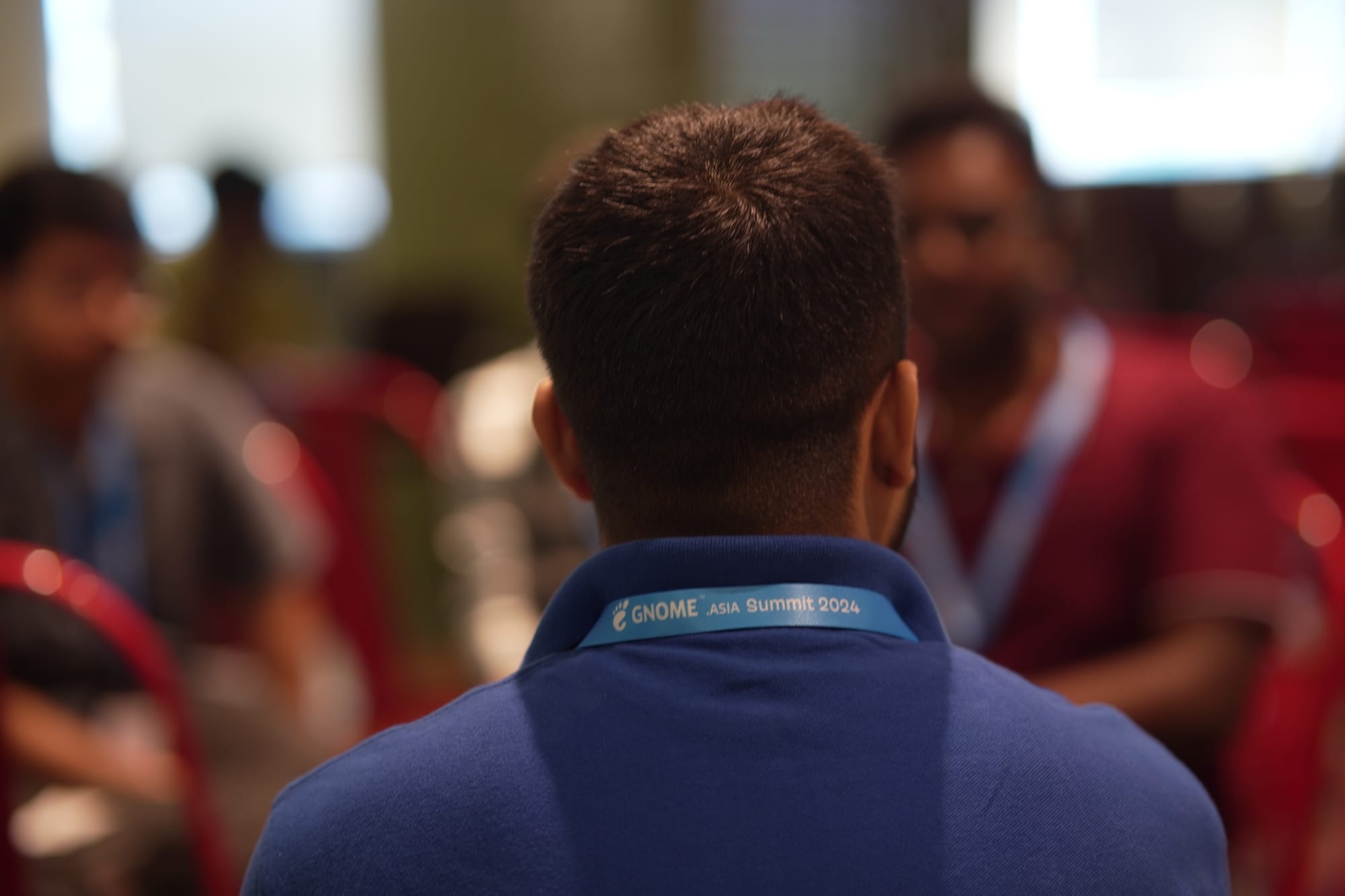
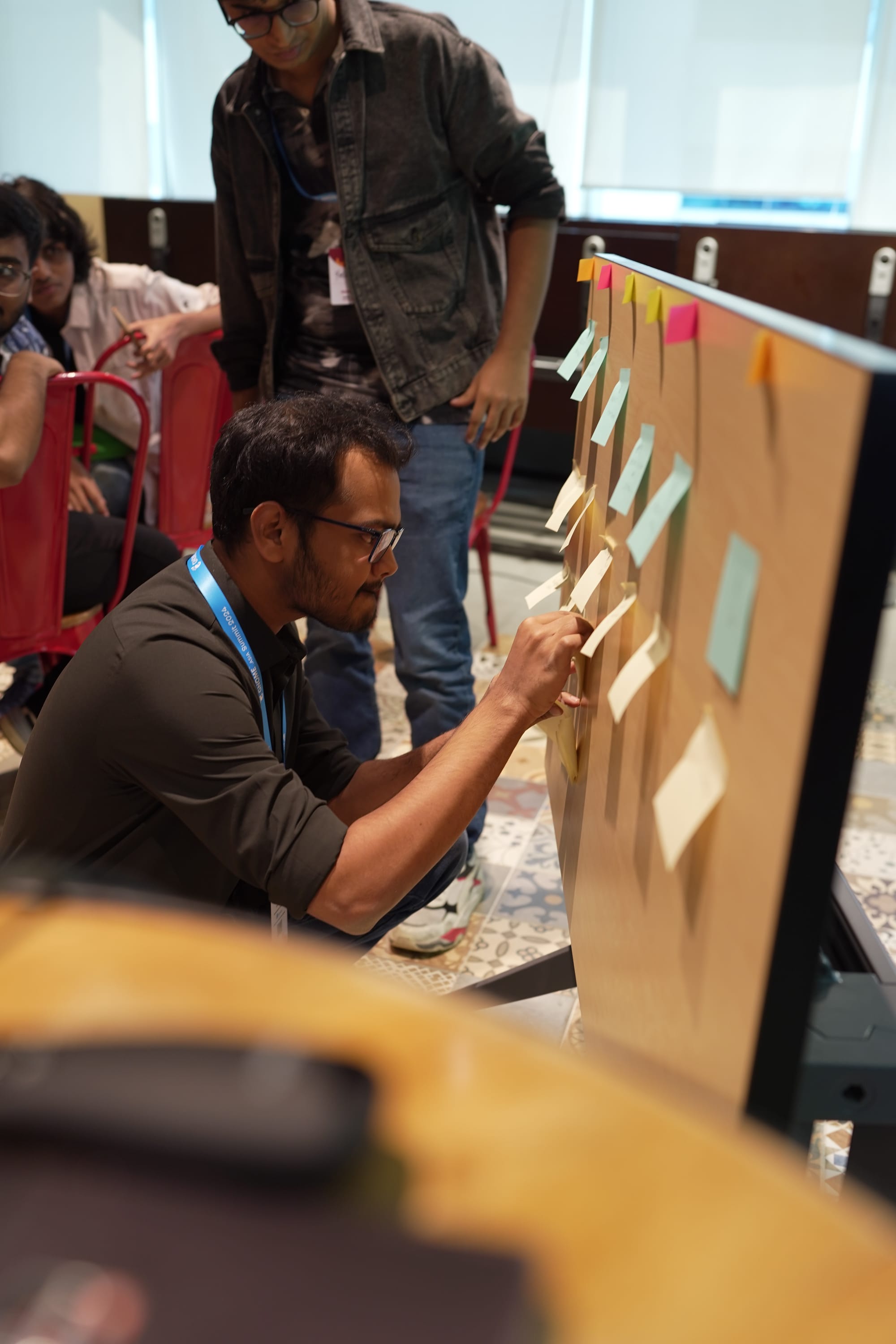
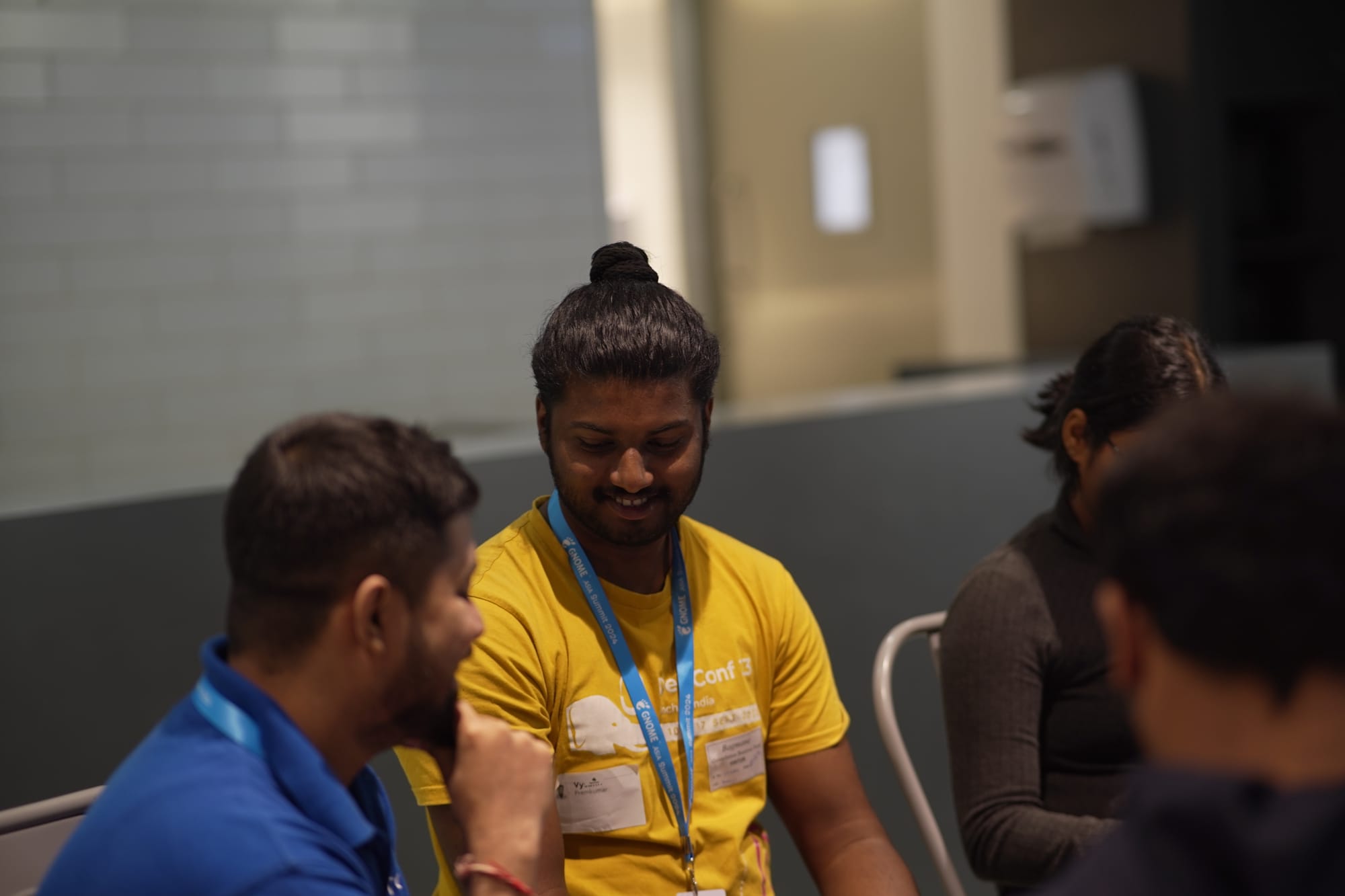
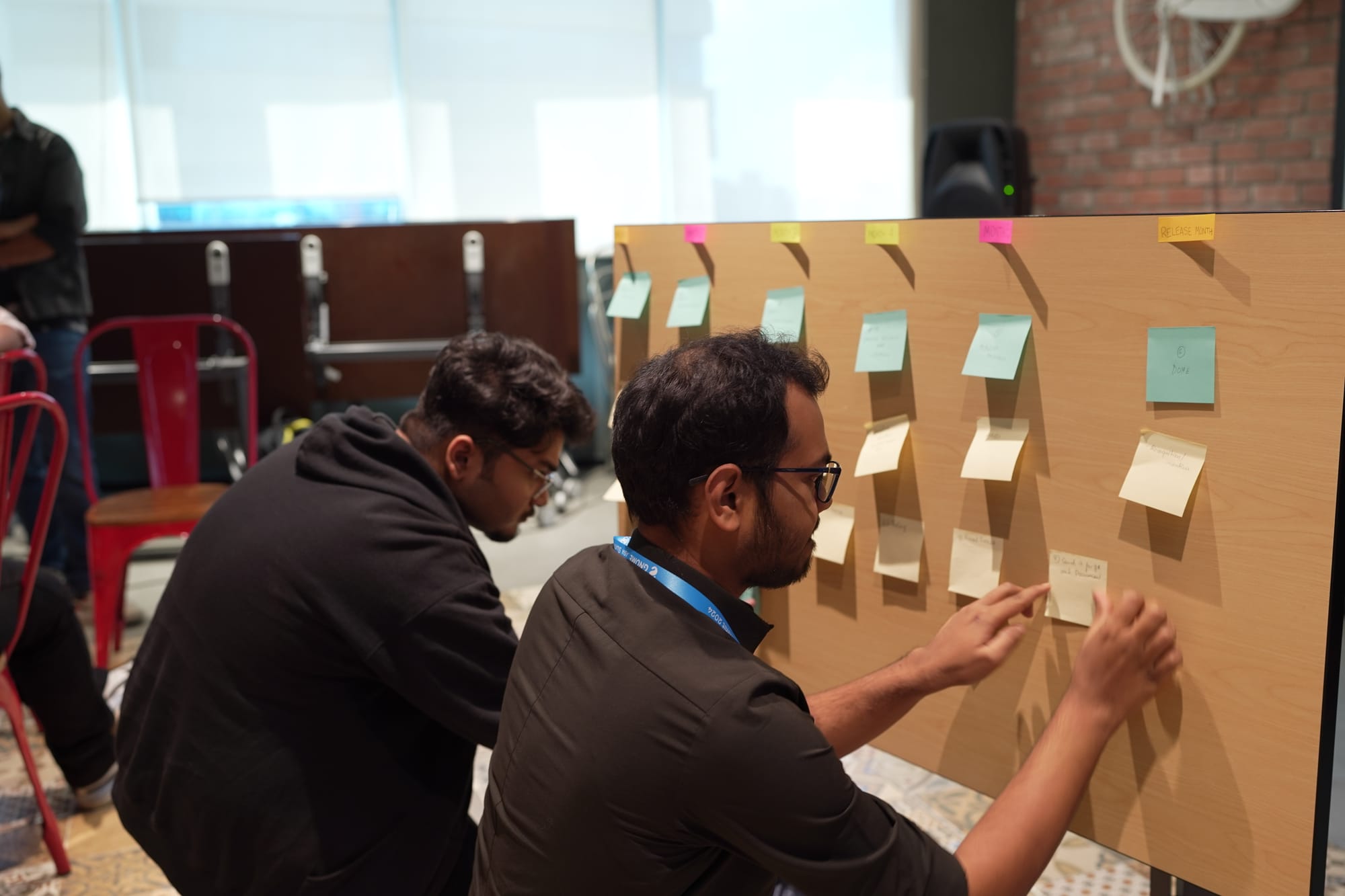
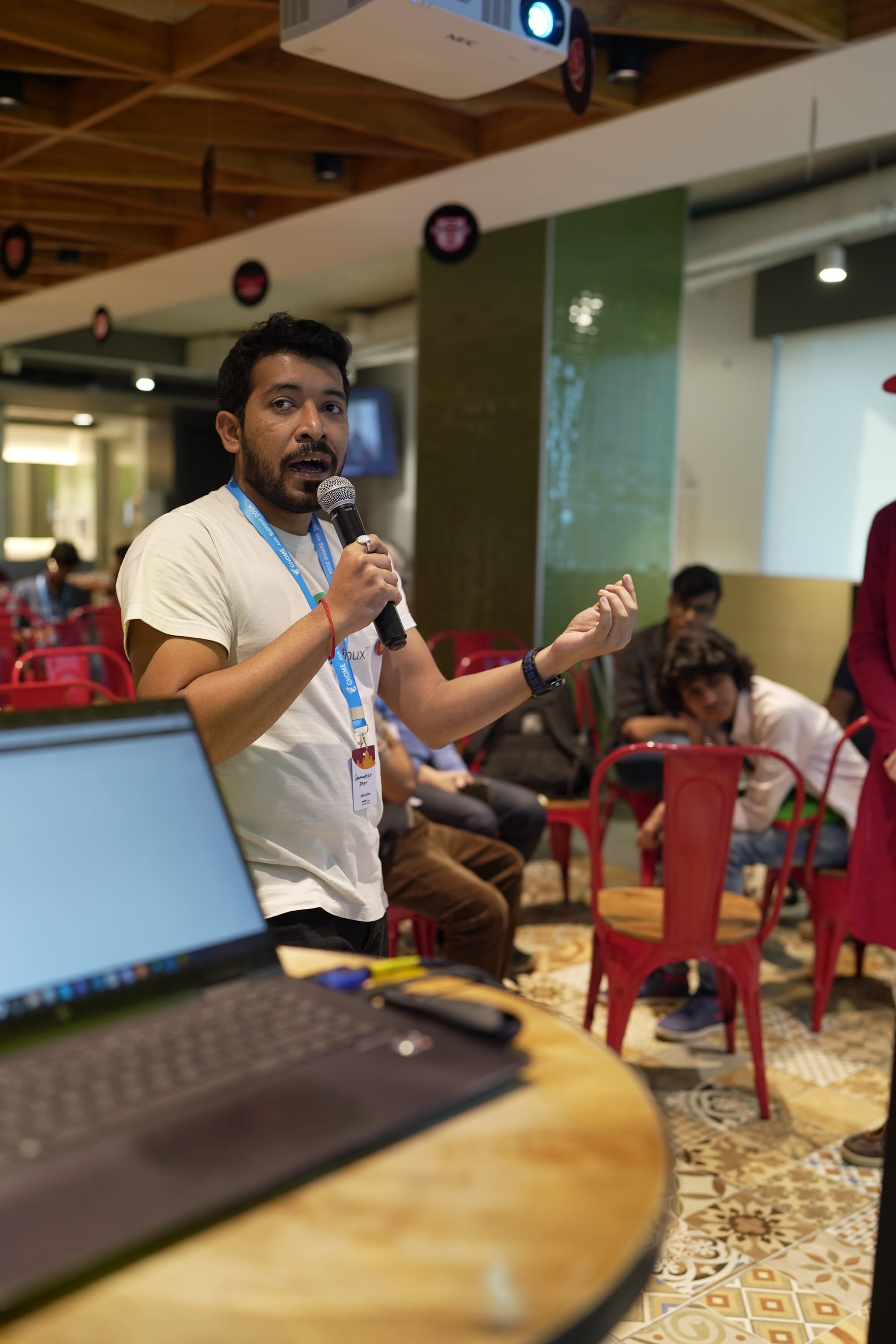
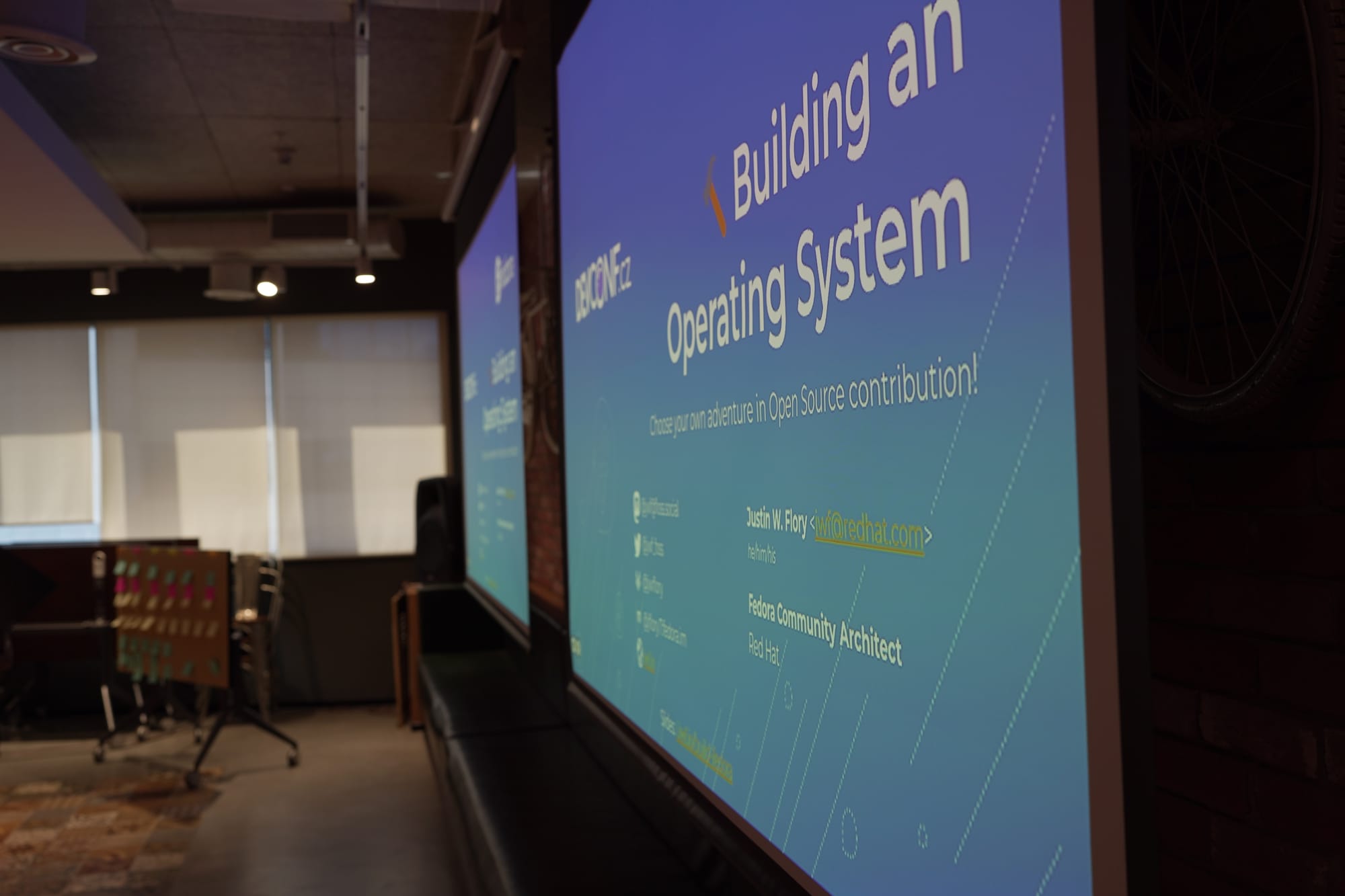
Some glimpses from the workshop called "Building An Operating System - Choose Your Own Adventure In Open Source Contribution" run by Justin (Courtesy. Sumantro Mukherjee CC-BY-SA 4.0)
Justin volunteered to part ways with some better flash drives that he had at hand - should it be required at the time but I decided that I would not let the panic get the best of me and instead go ahead with the hotfixes before tomorrow's talk was scheduled. Surely enough, I was able to find the offending (or in this case, offended) part of the code that required changes and I went ahead with making those and pushing an alpha release on PyPI. In hindsight - I was glad that I was able to test things out before the presentation so even when it broke - I had some time on my hands to get things fixed. After getting a couple of USB flash drives written onto using the newly added changes and fixing the testcases to ensure that the stellar 100% coverage was retained after 45 minutes or so - I was satisfied with the results and decided to join Soumadeep in Justin's workshop on "Building An Operating System - Choose Your Own Adventure In Open Source Contribution!".
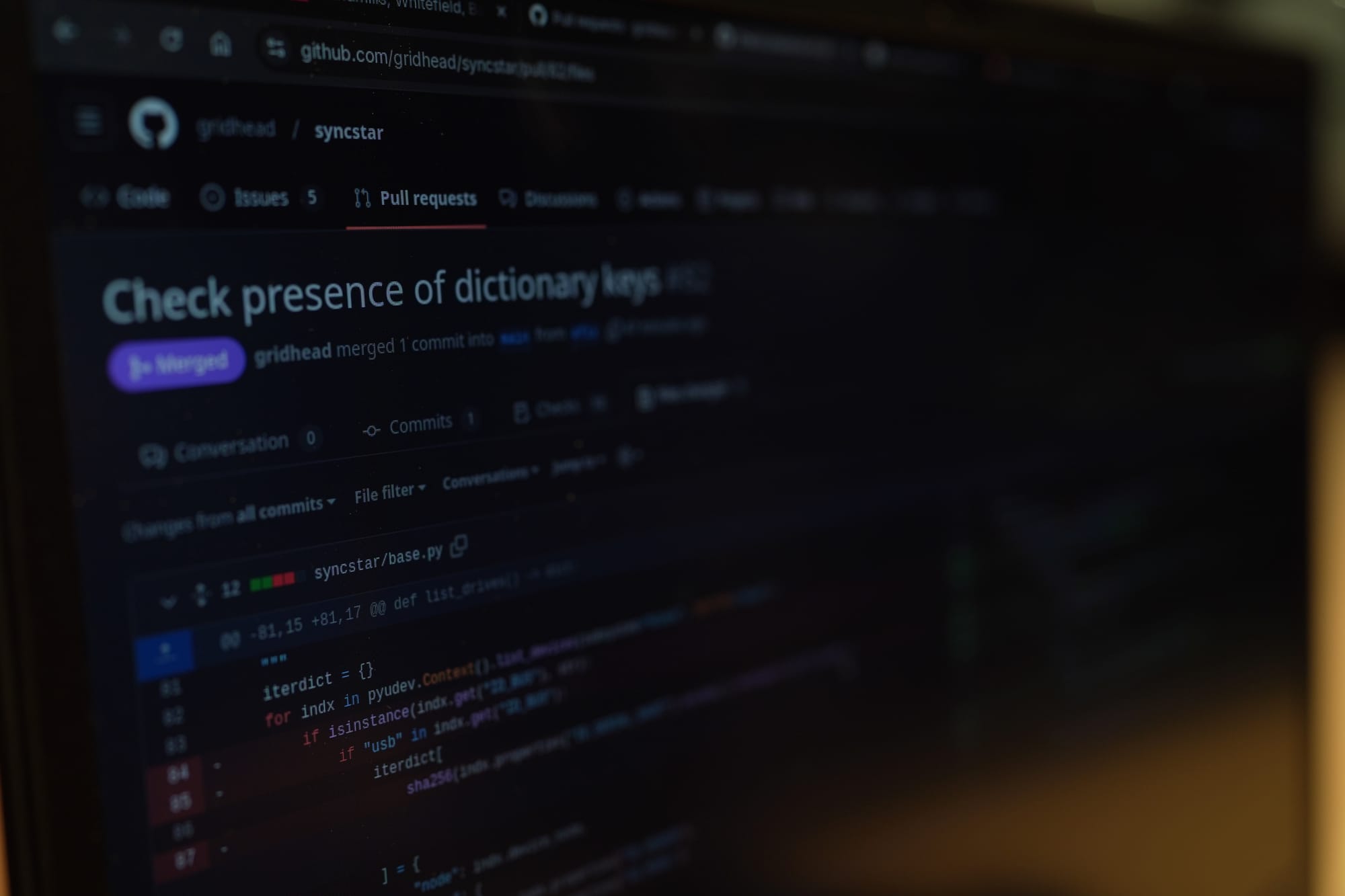
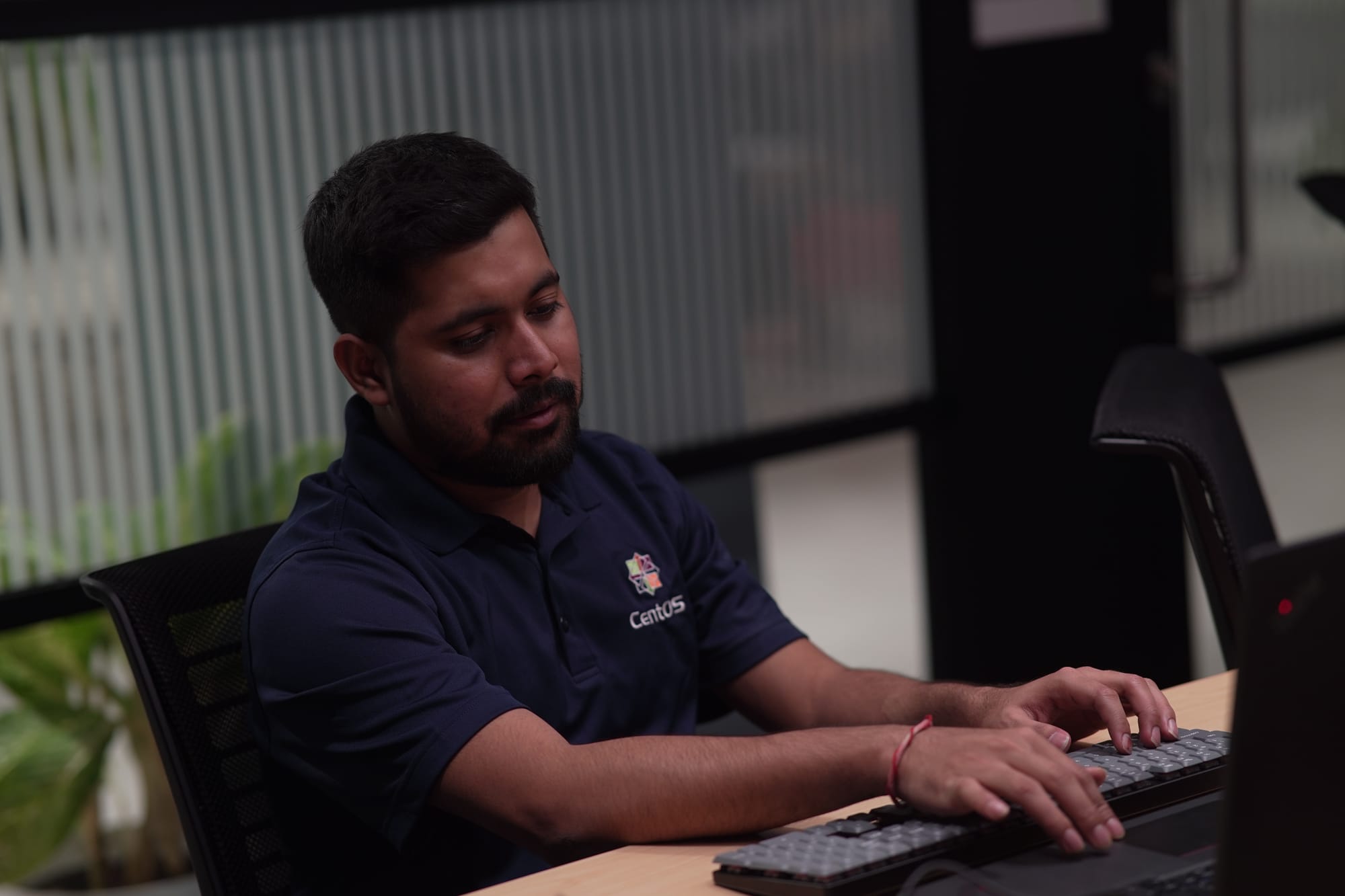
Akashdeep attempting to resolve the recently discovered issue with SyncStar after trying to flash the Micro Center branded generic flashdrives (Courtesy. Sumantro Mukherjee CC-BY-SA 4.0)
I checked with Sumantro and Justin at the same time about whether they would be willing to perform a certain roleplay acting as attendants and attendees of a GNU/Linux Distribution booth in a Free and Open Source Software Conference like FOSDEM. Heading into the event, I joined a couple of different groups to work through the tasks prescribed by the session and once this was done, I went ahead to introduce Ramakrishna to the stage for his keynote presentation named "FOSS, Chai and Change - Brewing Innovation In India" at around 0345pm Indian Standard Time. Aaditya requested me to do that as the GNOME community folks were gone for a late lunch and could not make it back in time so I obliged and helped out with not only that but also delivering the closing statement for the day and facilitating a group photograph session after the amazing talk was through - and so were we with successfully organizing the first day of GNOME Asia 2024.
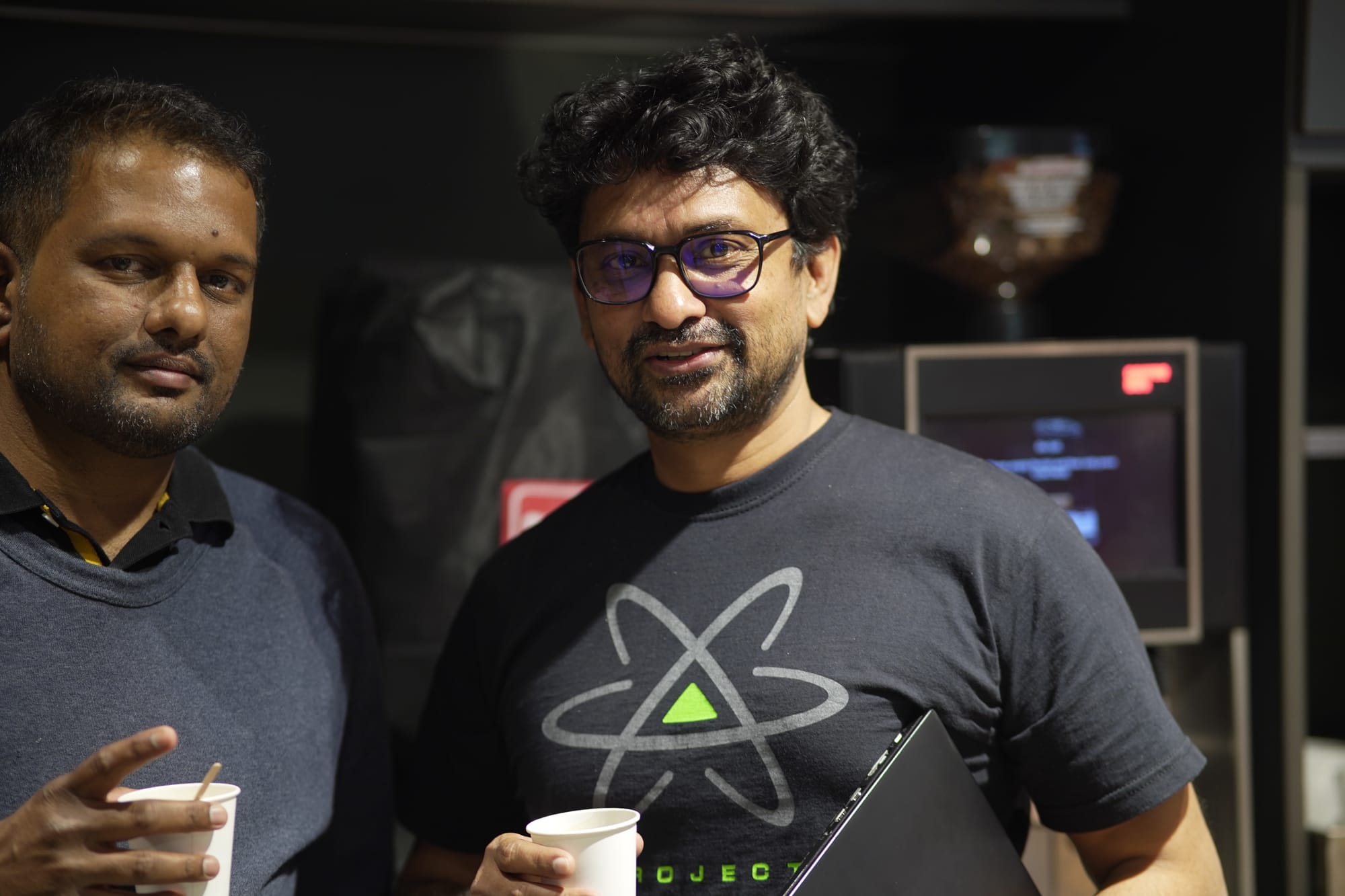
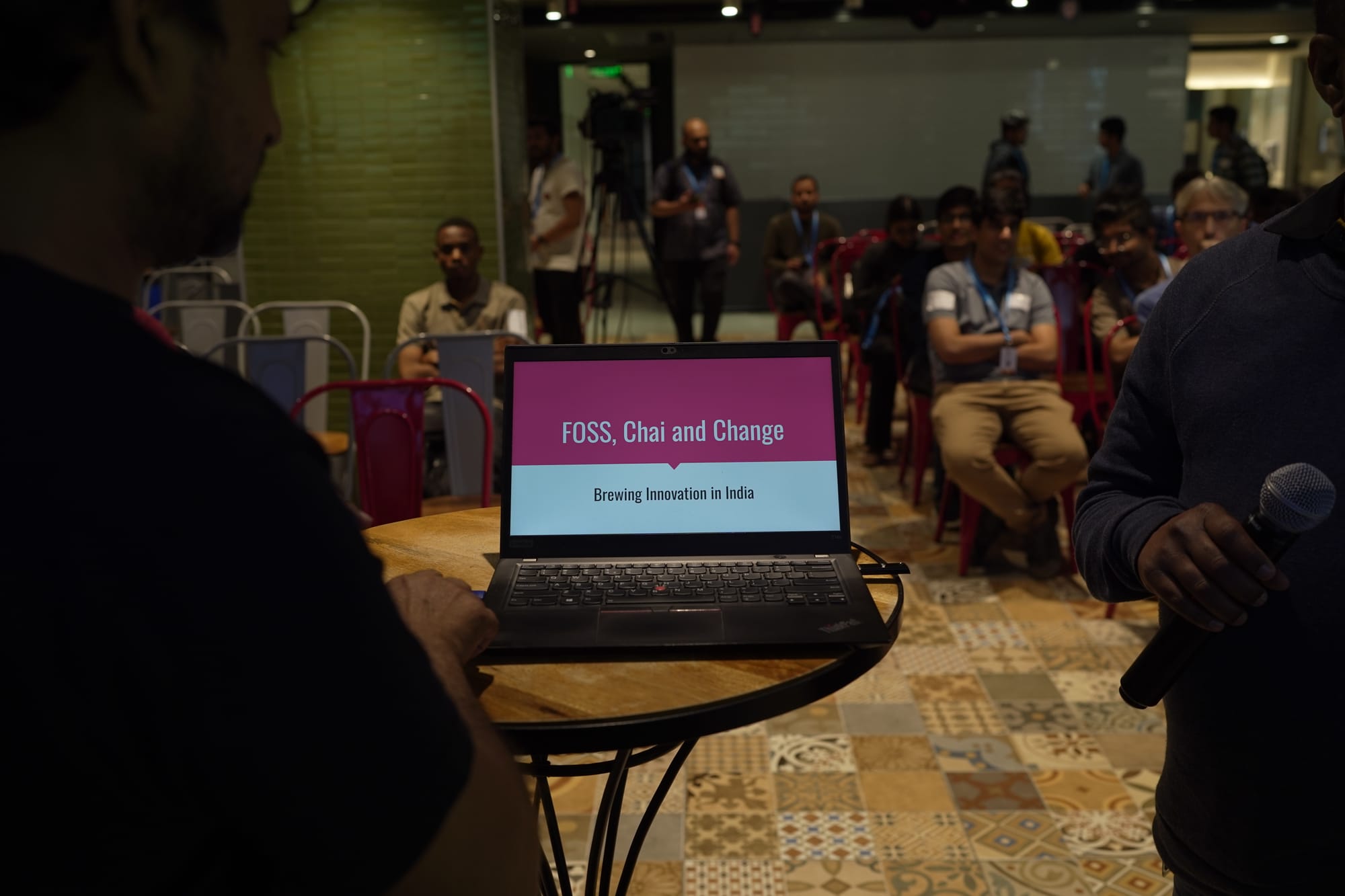
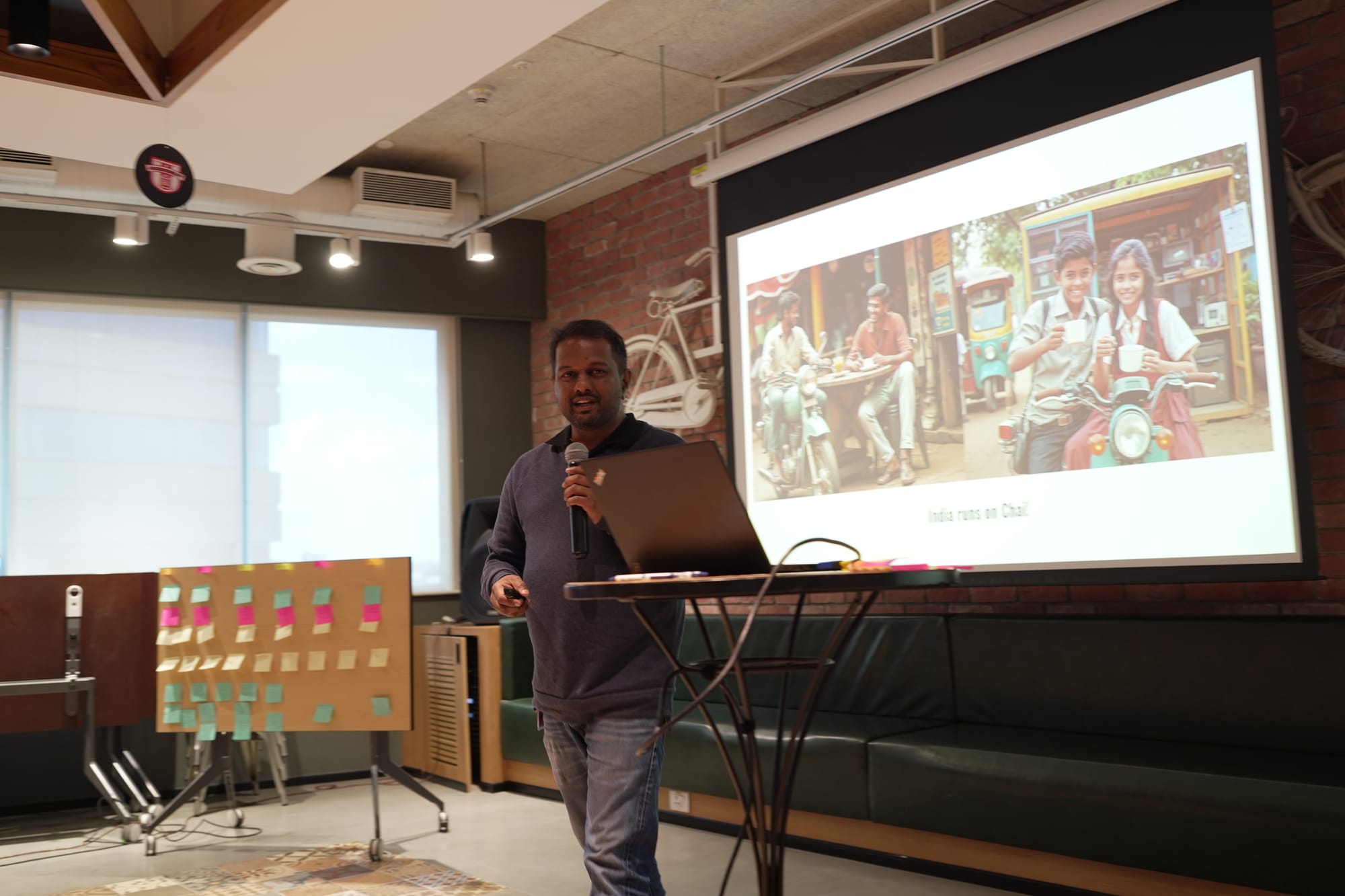
Ramakrishna Yekulla serving his profound experience in free and open source software, one cutting chai cut at a time - starting with Sudhir, of course (Courtesy. Sumantro Mukherjee CC-BY-SA 4.0)
GNOME community folks allowed me to have a bunch of moments where we clicked some goofy photographs and relished the friendly nature of what results in tying strong bonds among multiple free and open source software communities. At around 0500pm Indian Standard Time, Justin went ahead with booking an Uber XL and I booked an Uber Sedan for us to make it back to the hotel finally. Once we were back at the hotel, we sorted out the payments for the hotel by replacing my personal credit card with that of Justin's corporate credit card - thereby hopefully reducing the overhead taken with the reimbursement processes. As Soumadeep and I lazed back in the room, the Fedora Project folks decided to settle on a place for dinner and invite GNOME community folks for the same - while ensuring that we picked a place that suited all the dietary preferences, taste requirements and the distance that it would have from the locations for the attendees to come from.
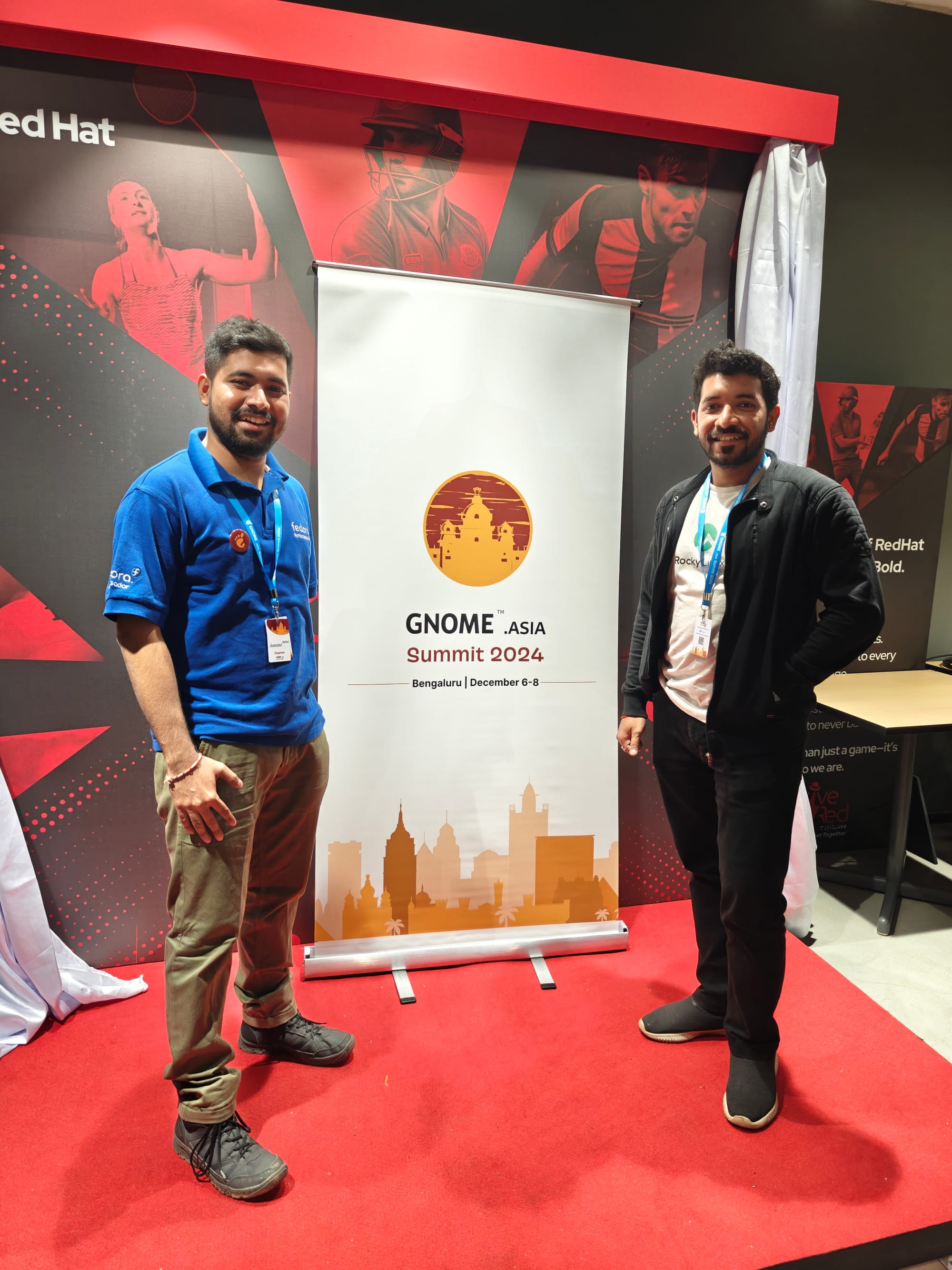
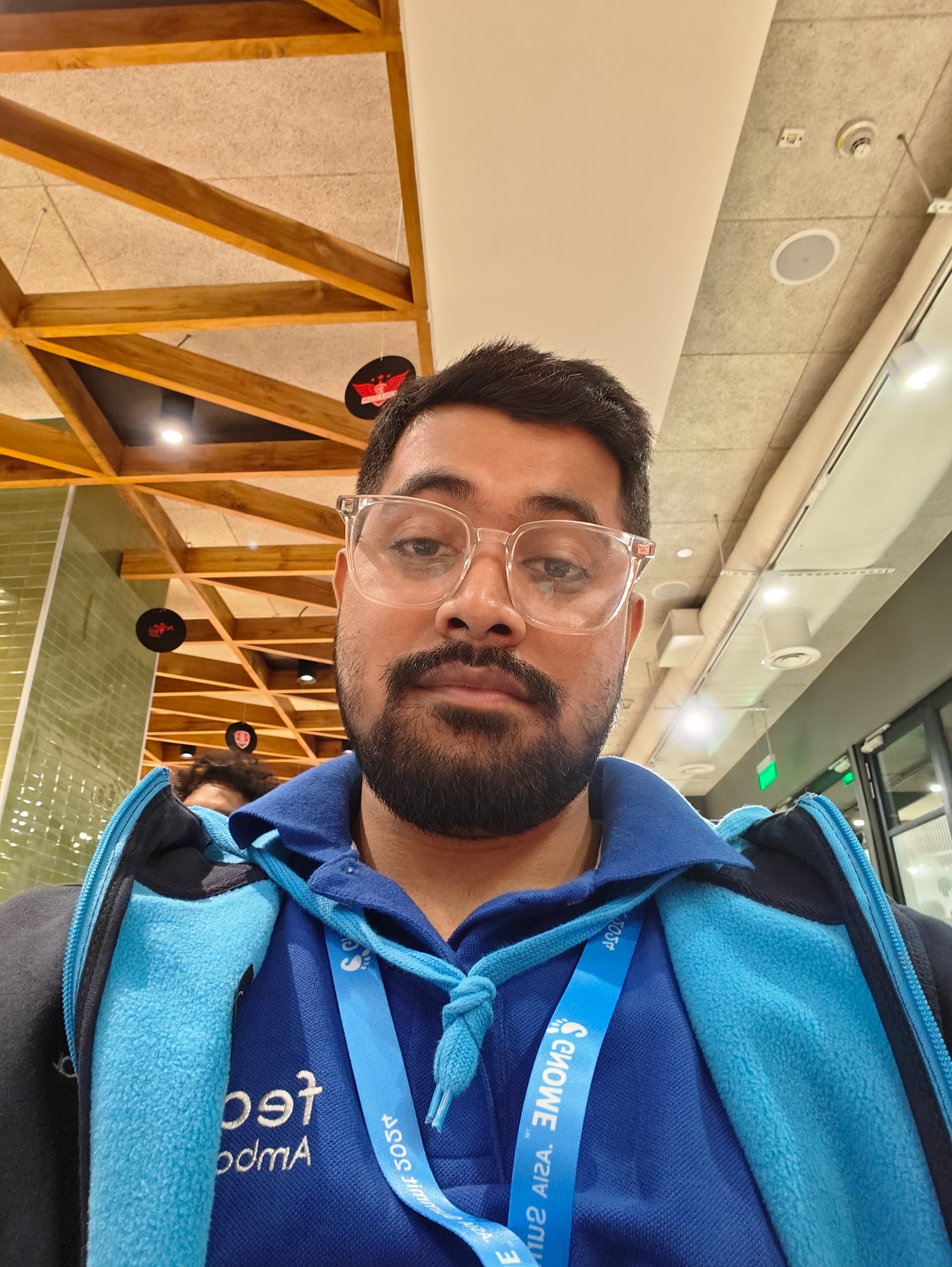
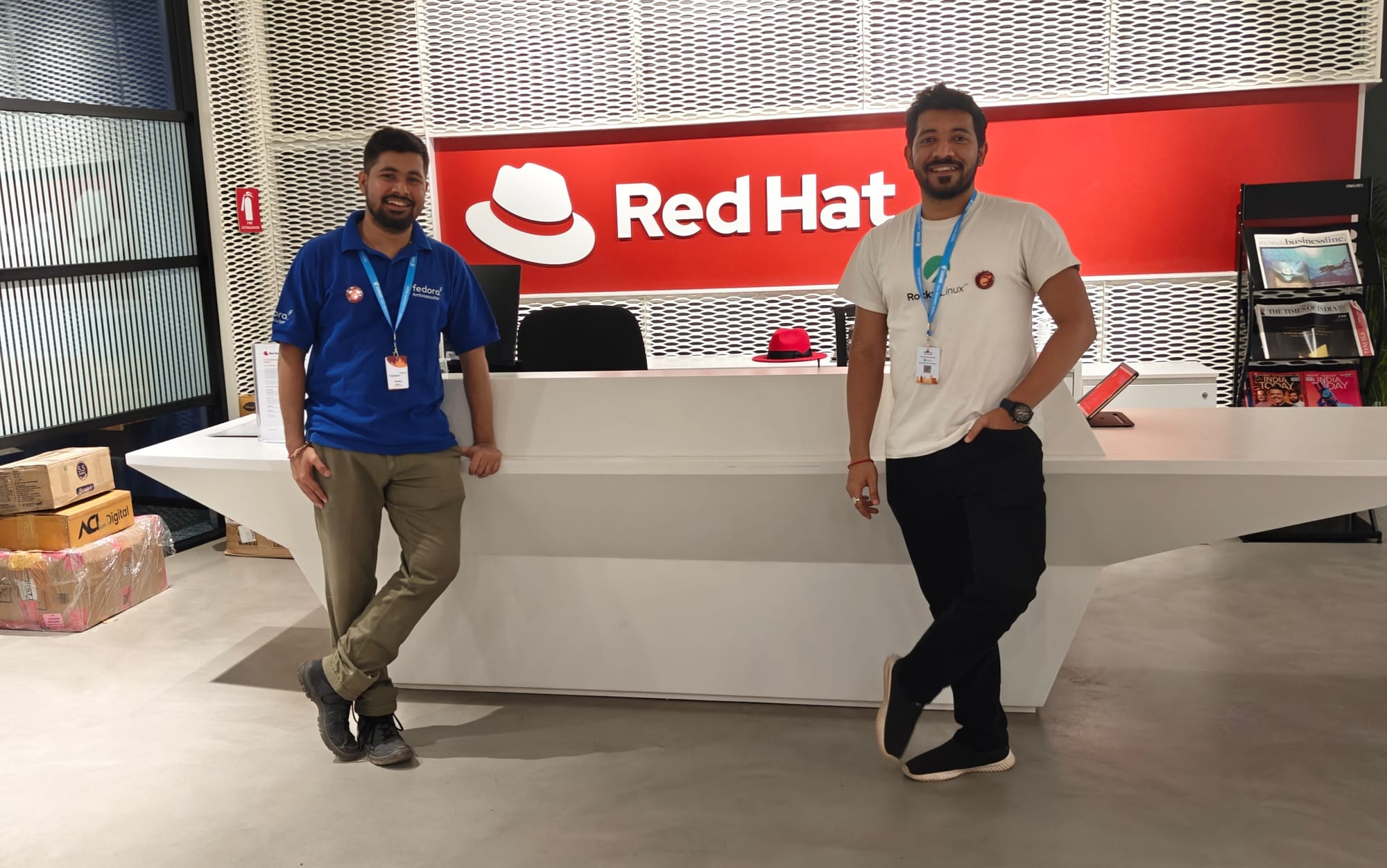
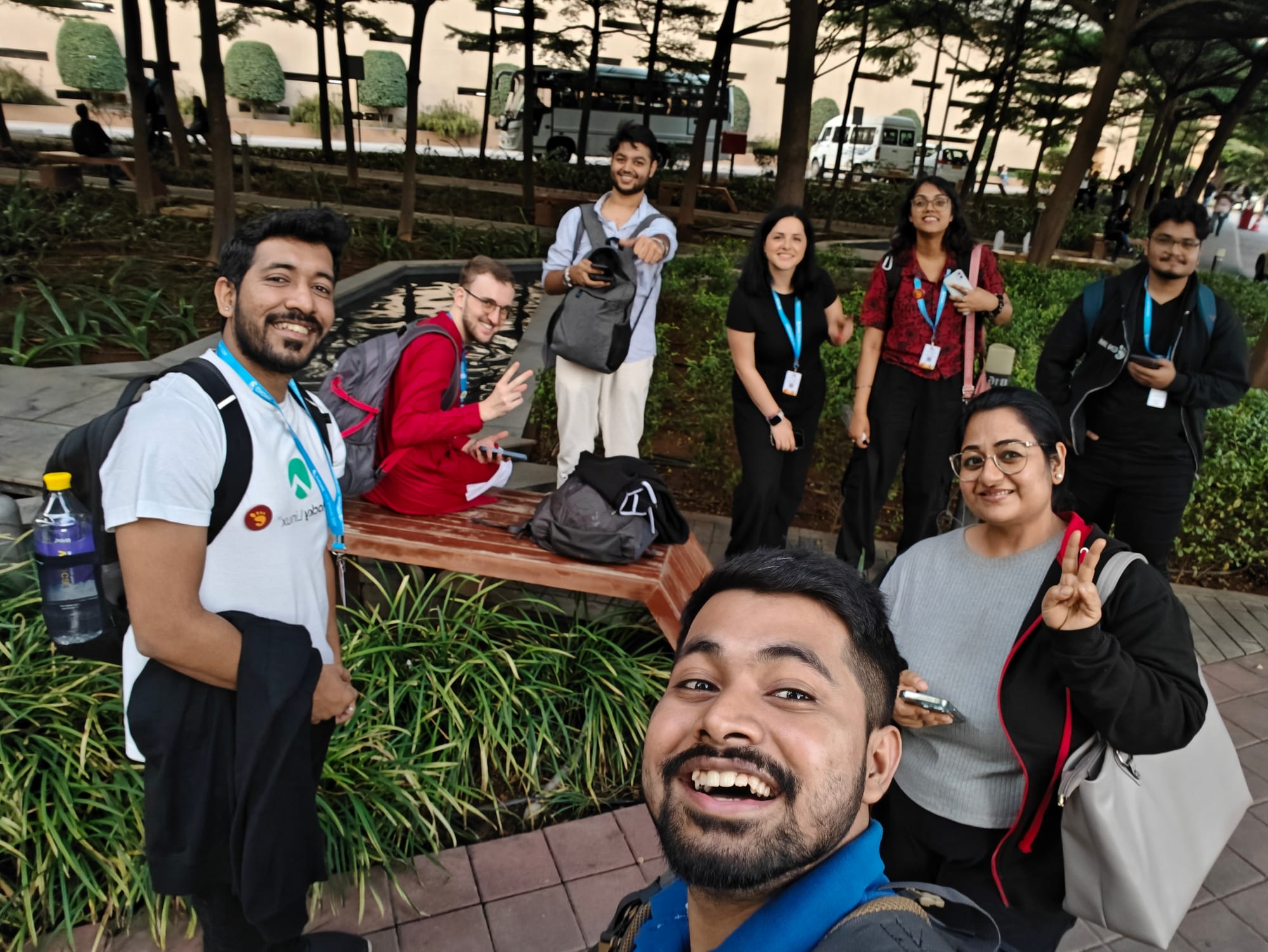
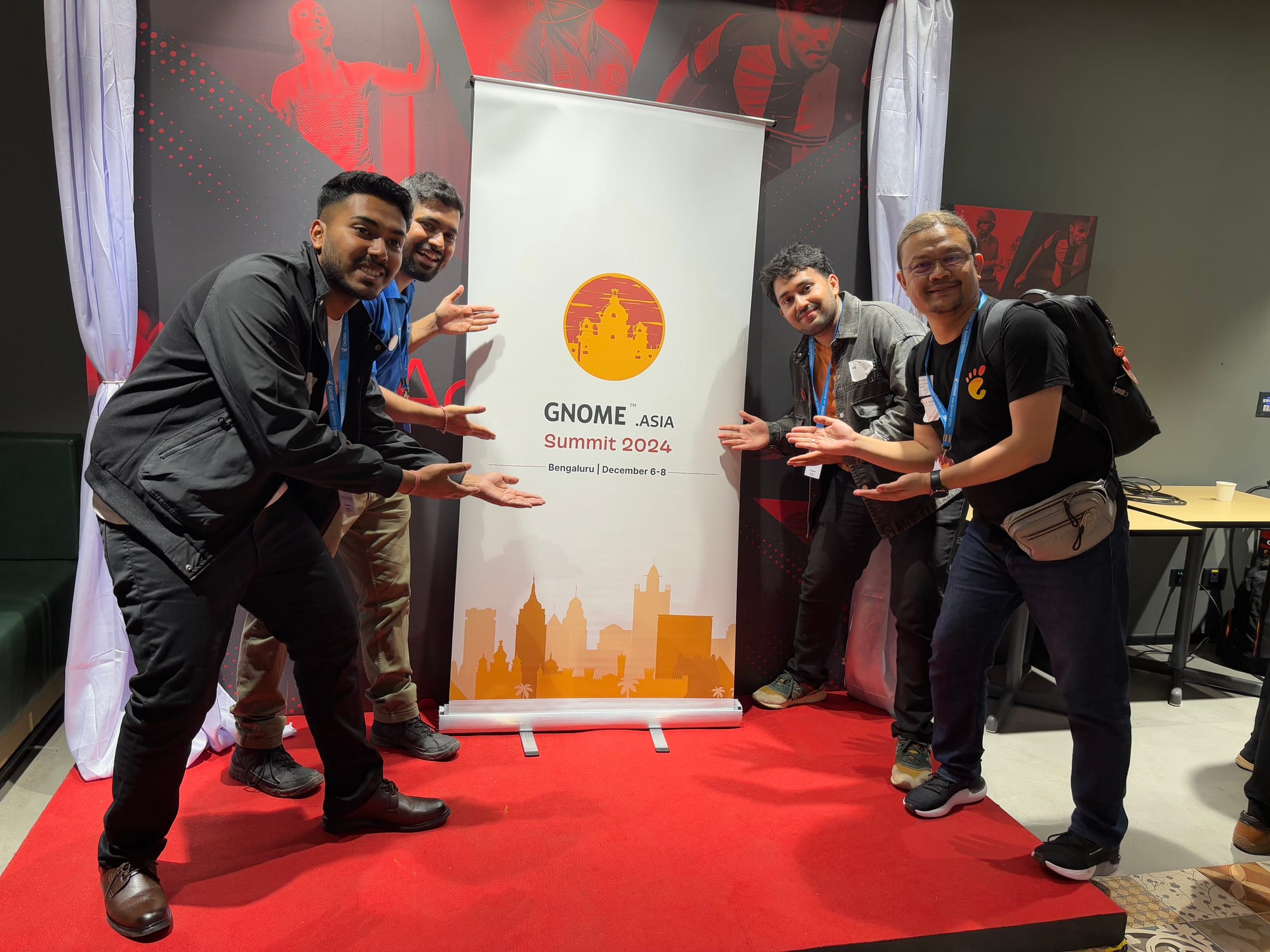
Some more goofing around the Red Hat office after the first day of the event was through and when we were waiting for our Uber cabs to arrive (Courtesy. Akashdeep Dhar CC-BY-SA 4.0)
After dismissing a bunch of restaurant choices - we finally settled for Skygarden Best Rooftop Bar & Kitchen Restaurant for which we left the hotel at around 0800pm Indian Standard Time. We were soon joined by Aaditya, Siddhartha and Asmit from the GNOME community. The table was swiftly divided between folks wanting to have a vegetarian diet versus those wanting to have a non-vegetarian diet for dinner and we shared some good conversations over tasty meals with the GNOME folks. The music was progressively becoming louder as the night was turning darker on the rooftop place we got to and at one point in time, we decided to be quickly done with the meal just to be able to get out of there as soon as possible and leave for the accommodation. With some minor troubles with the payment and some pictures clicked with the Fedora Project and GNOME community folks, it was time to look for cabs to head back to the hotel.
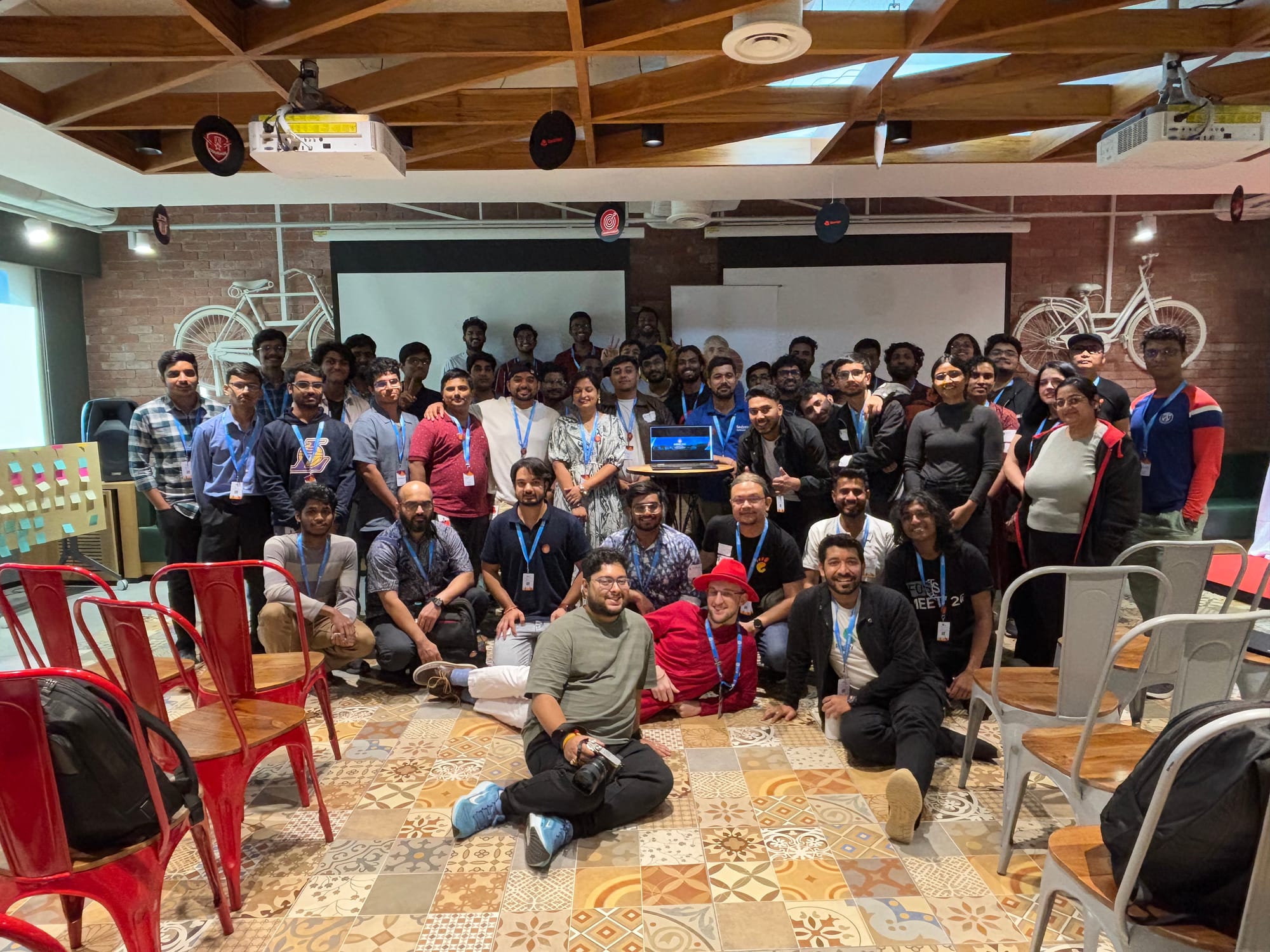
Soumadeep left in a separate cab towards his accommodation and as I made it back to my room, I realized that my nose had started bleeding with all the commotion and stress that I had throughout the day. I informed my brother of the same and asked him not to worry - which, in retrospect, I should not have done as that only made him worry more. I got myself a bucket of icecubes to tend to my headaches but I indeed was worried about the worsening situation as I felt the blood trickle down my throat as well. I was soon visited by Sumantro who, I kid you not, ensured that I headed to my bed and took care of me for at least an hour. Soumadeep seems to have informed Sumantro, on which he acted and while I said at the situation that no help was needed, I was most certainly grateful for him staying back with the nursing back to health (and the big brother scolding for not taking care of myself, of course) as late as 1130pm Indian Standard Time.
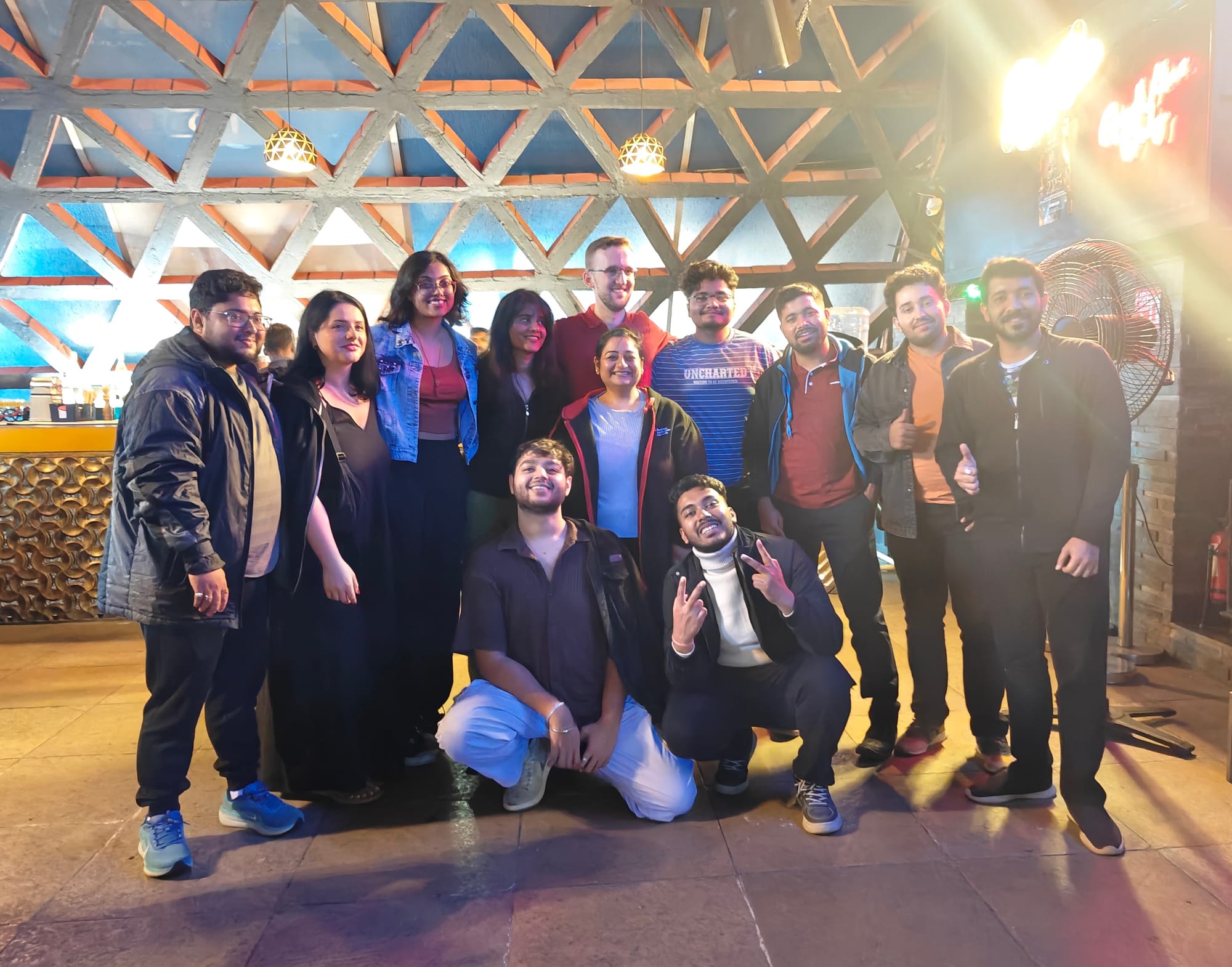
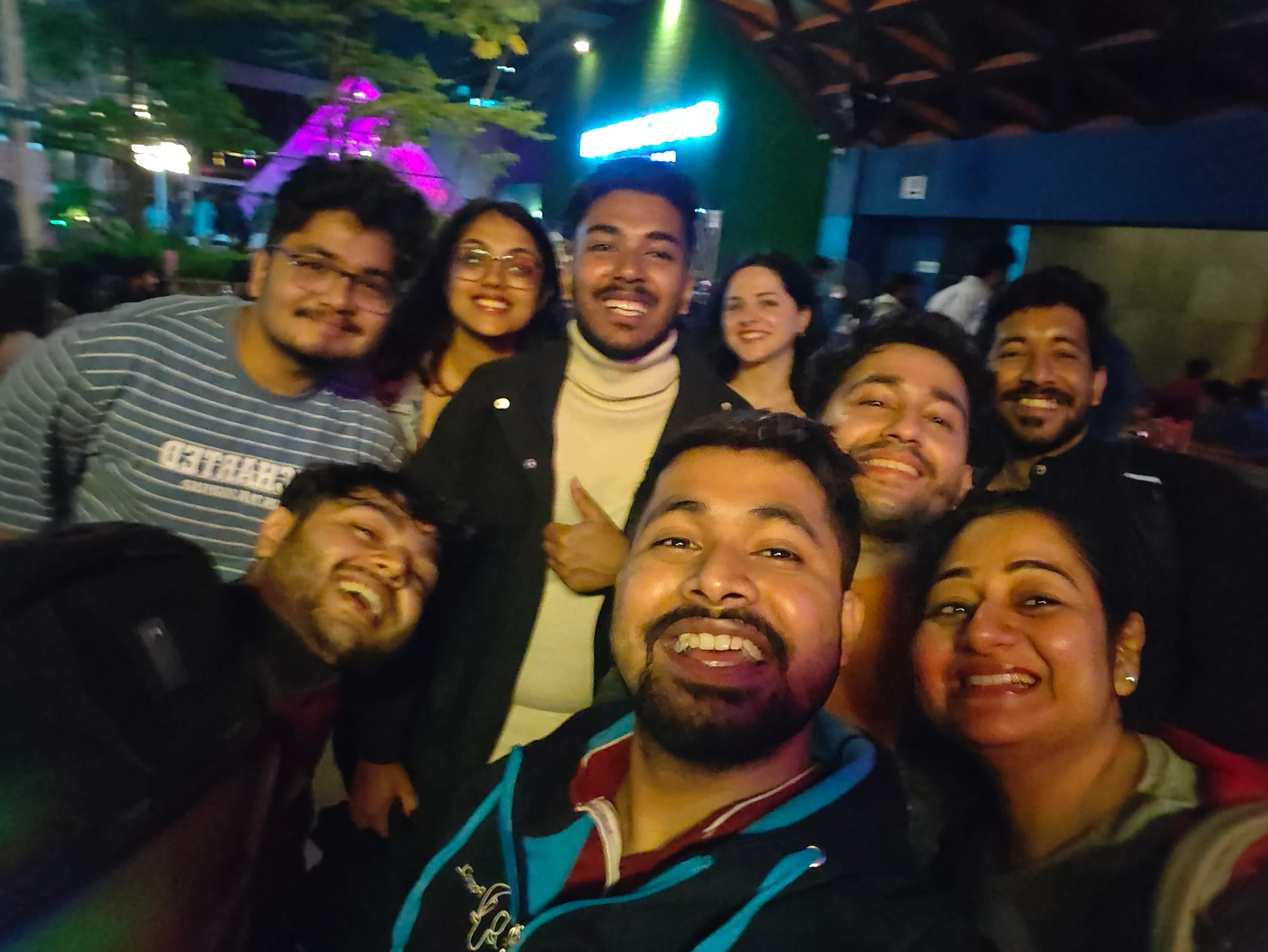
You can never have enough of these bonding photographs in free and open source software communities as friendly as those of Fedora Project and GNOME community (Courtesy. Akashdeep Dhar CC-BY-SA 4.0)
It was high time for me to introspect the situation around my health as I had a similar problem earlier this year when I was visiting Amsterdam for the Fedora Council F2F hackfest. I informed Justin about the same on the off-chance of things going sideways and decided to get my bloodworks done as soon as I got back to understand the underlying problem in my constitution. It was also the time that I decided to take it easy for the second day of GNOME Asia 2024 and focus only on the important things like my presentation titled "Introducing SyncStar - Create Bootable Media At Conference Kiosks" that I had planned for tomorrow. With Sumantro ensuring that I had some cold water to sip to help with the bleeding nose, he left for his room and I decided to get myself freshened up again before I called it a day at around 1200am Indian Standard Time - leaving tomorrow's problems for tomorrow's myself to handle and focussing on resting instead.